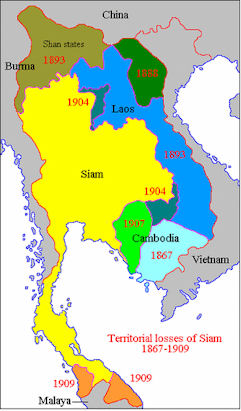

Zitierweise / cite as:
Payer, Alois <1944 - >: Chronik Thailands = กาลานุกรมสยามประเทศไทย. -- Chronik 2007 / B. E. 2550. -- 3. Juli bis Dezember. -- Fassung vom 2017-03-21. -- URL: http://www.payer.de/thailandchronik/chronik2007c.htm
Erstmals publiziert: 2012-11-09
Überarbeitungen: 2017-03-21 [Ergänzungen] ; 2016-01-02 [Ergänzungen] ; 2015-07-05 [Ergänzungen] ; 2015-06-07 [Ergänzungen] ; 2015-04-18 [Ergänzungen] ; 2015-04-05 [Ergänzungen] ; 2015-01-19 [Ergänzungen] ; 2014-11-04 [Ergänzungen] ; 2014-09-17 [Ergänzungen] ; 2014-09-04 [Ergänzungen] ; 2014-02-22 [Ergänzungen] ; 2013-11-18 [Ergänzungen] ; 2013-04-25 [Ergänzungen und Teilung des Jahrgangs]; 2013-04-21 [Ergänzungen]; 2013-04-09 [Ergänzungen]; 2013-04-03 [Ergänzungen]; 2013-03-27 [Ergänzungen]; 2013-03-17 [Ergänzungen]; 2013-03-09 [Ergänzungen]; 2013-02-27 [Ergänzungen]; 2013-02-22 [Ergänzungen]; 2013-02-17 [Ergänzungen]; 2013-02-16 [Ergänzungen]; 2013-02-05 [Ergänzungen]; 2013-01-26 [Ergänzungen]; 2013-01-13 [Ergänzungen]; 2012-11-13 [Verbesserungen]
©opyright: Dieser Text steht der Allgemeinheit zur Verfügung. Eine Verwertung in Publikationen, die über übliche Zitate hinausgeht, bedarf der ausdrücklichen Genehmigung des Herausgebers.
Dieser Text ist Teil der Abteilung
Thailand von
Tüpfli's Global Village Library
ช้างตายทั้งตัวเอาใบบัวปิดไม่มิด
|
Gewidmet meiner lieben Frau Margarete Payer die seit unserem ersten Besuch in Thailand 1974 mit mir die Liebe zu den und die Sorge um die Bewohner Thailands teilt. |
|
Bei thailändischen Statistiken muss man mit allen Fehlerquellen rechnen, die in folgendem Werk beschrieben sind:
Die Statistikdiagramme geben also meistens eher qualitative als korrekte quantitative Beziehungen wieder.
|
2007-07
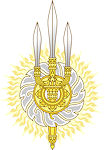
Es erscheint:
A collection of citations honouring His Majesty King Bhumibol Adulyadej of Thailand by foreign institutions and organizations (Dezember 1959 - July 2007) = [Paralleltitel in Thai] / Published by the Privy Council. -- 2007. -- ISBN 978-974-8049-83-0
Abb.: EinbandtitelDarin sind die 38 solchen Ehrungen sowie die sieben Patente Seiner Majestät dokumentiert. Die Auflage beträgt 10.000. Ausgewählte ausländische Bibliotheken werden mit einem Gratisexemplar beehrt. Nicht alle wissen diese Ehre zu schätzen, sondern einige schmeißen das aufwendige Werk in den Papierkorb.
2007-07-01

Robert Bruce Zoellick (USA, 1953 - ) wird Präsident der Weltbank.
Abb.: Robert Bruce Zoellick / von Murray Webb (1947 - ), 2008
[Bildquelle: Robert Zoellick. 9 July, 2008. Webb, Murray, 1947- :[Digital caricatures published from 29 July 2005 onwards (2006, 2007, 2008). Includes a selection of digital caricatures published from 2002 and up to July 2005.]. Ref: DCDL-0007046. Alexander Turnbull Library, Wellington, New Zealand. http://natlib.govt.nz/records/22636526 . -- Zugriff am 2013-03-09. -- "You can copy this item for personal use, share it, and post it on a blog or website. It cannot be used commercially without permission"]
2007-07-06
Der NGO-Aktivist Sombat Boon-ngamanong (สมบัติ บุญงามอนงค์, aka Bo.Ko. Lai Chud - บ.ก.ลายจุด, 1968 - ), einer der Anführer des Protests gegen den Militärputsch von 2006-09-16 und Gründer von "Thais say No" wird in Chiang Rai (เชียงราย) währen einer Rede bei einer Protestveranstaltung festgenommen, verhört, und nach 24 Stunden wieder freigelassen.
Abb.: Sombat Boon-ngamanong (สมบัติ บุญงามอนงค์)
[Bildquelle: http://www.prachatai.com/journal/2010/07/30342. -- Zugriff am 2015-01-19. -- Fair use]
2007-07-07
Gründung der staatlichen Thailand Greenhouse Gas Management Organisation (Public Organisation) (องค์การบริหารจัดการก๊าซเรือนกระจก (องค์การมหาชน)
Abb.: ®Logo
2007-07-16
Die Bank of Thailand kündigt an, dass sie Maßnahmen gegen den ständig steigenden Wechselkurs des Baht ergreifen will. Der hohe Wechselkurs erschwert Thai-Exporte.
Abb.: Für 1 US-$ bekommt man immer weniger Baht: Wechselkursentwicklung (monatliche Mittelwerte) 2007
2007-07-19
Premiere des Films Kung Fu Tootsie (ตั๊ดสู้ฟุด) von Jaturong Mokjok (จตุรงค์ มกจ๊ก, 1963 - ).
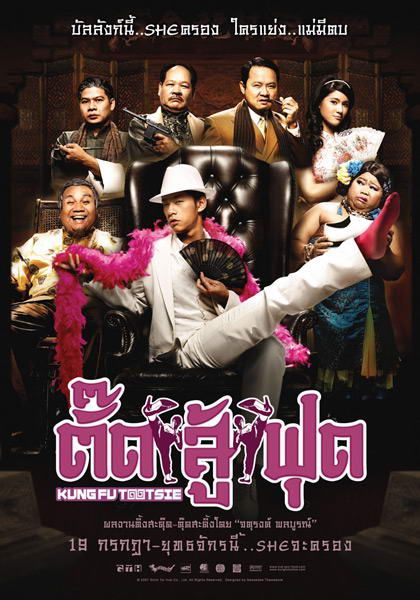
Abb.: Plakat
[Bildquelle: Wikipedia. -- Fair use]
|
"Kung Fu Tootsie (Thai: ตั๊ดสู้ฟุด or Tat soo foot) is a 2007 Thai action-comedy film written and directed by Jaturong Mokjok (จตุรงค์ มกจ๊ก, 1963 - ). TitleThe English title of the film is an allusion to the 1982 American comedy film Tootsie (1982). A Thai slang term for transvestite or effeminate man, toot (ตุ๊ด), comes from the first syllable of Tootsie. The Thai name of the film, Tat soo foot is a Thai spoonerism for toot soo fat, which translates roughly as "butt-kicking sissy". PlotKung Fu Tootsie is set in Hong Kong, the story of Tien (เทียน) and Tao, twins separated at birth. When Tao, living with his wealthy mafioso father, Ma Yong Hai (หม่าหย่งให่), is mutilated by a rival gang, Ma must find his lost son Tien, living in poverty with his mother, to become the next head of the family. Antics ensue, however, when Tien turns out to be more 'Sonny and Cher' than 'Sonny Corleone'. Cast
[Quelle: http://en.wikipedia.org/wiki/Kung_Fu_Tootsie. -- Zugriff am 2013-03-26] |
2007-07-18

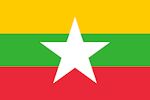
Telegramm der US-Generalkonsulin in Chiang Mai (เชียงใหม่), Beatrice (Bea) Camp, an das US-Außenministerium:
"1. SUMMARY. Exile political and social activists from Burma are using Chiang Mai [เชียงใหม่] as a base for the training and development of a new generation of leaders. Like their counterparts in the media (reftel), political exiles have found Chiang Mai to be a convenient and relatively safe harbor from which to engage in activities restricted by Burma's ruling junta. With help from foreign government funding and implicit RTG [Royal Thai Government] permission to operate on Thai soil, organizations here have created a shadow educational and professional development system for hundreds of young activists. End Summary. 2. Leadership training NGOs that have established roots in Chiang Mai in recent years include the
- Foreign Affairs Training program for political activists,
- the Community Development and Civic Empower program for social development workers, and
- the School for Shan State Nationalities Youth for younger leaders from underserved communities.
Like other civil society training groups in the city, these organizations cite Chiang Mai's proximity to Burma, low cost of living, and good connectivity with the outside world as top draws. Western governments and foundations provide most funding, while Thai officials sympathetic to these programs' causes are willing to host their schools in Thailand -- although security concerns usually prompt the organizations to operate out of unmarked compounds on the edge of town.
3. Security issues mean most students keep a low profile as well and say they rarely interact with their Thai neighbors. Some tell of slipping across the border in the middle of the night or trekking through the Burmese jungle for several days in order to reach Chiang Mai in time for their program's start date. When they arrive, they find themselves in a microcosm of the Burma that could have been - a dynamic mix of ethnicities living and working together toward shared goals. Here in the classroom and on the compounds, English and Burmese are more likely to unite the students than their own native languages and dialects, and many students admit to forming their first positive impressions of other ethnic groups via their experience in Chiang Mai.
4. ConGen [Consulate General] Chiang Mai has supported these groups through book donations, speaking at class graduations, and inviting students to the consulate for discussions on U.S. foreign policy,. At the same time, students and staff have become valuable sources for information on Burma and border security issues. Most USG [United States Government] Burma-related funding in Thailand concentrates on health issues or on activities along the border, but even programs not receiving U.S. grants are overwhelmingly pro-American. Instructors draw inspiration from U.S. models on everything from political development to educational testing.
5. The following three organizations represent the variety of programs --
- political activism,
- community development, and
- professional skills - present in Chiang Mai.
The programs are different in scope and mission, but all produce similar results: students gain skills and inspiration to pursue careers that likely would be denied to them in Burma. Political Exiles Get Crash Course on International Human Rights Advocacy
6. The FOREIGN AFFAIRS TRAINING (FAT) program is sponsored by the National Council of the Union of Burma [ပြည်ထောင်စုမြန်မာနိုင်ငံအမျိုးသားကောင်စီ] (NCUB), a multi-ethnic, Thailand-based political exile group that supports democracy building and reconciliation efforts in Burma. The program, now on its fifth class, receives money primarily through an NCUB grant via the Dutch government. Other EU governments assist with logistical support. FAT brings together up to two dozen young leaders from Burma-focused NGOs for training sessions on international relations, history, English, and professional skills. For nine months, the students, most aged 21-25, receive a crash course in the liberal arts with a focus on Burma affairs and using their knowledge for public advocacy. Each FAT class draws from a variety of Burmese groups, both inside and outside of Burma. The current class represents several ethnicities, including Burman, Karen [ကညီကလုာ်], Karenni [ကယားလူမျိုး], Mon [မောန်], and Kachin [景颇族].
7. Following formal studies at a Chiang Mai compound, FAT graduates serve in one-year internships at human rights NGOs around the world. Previous students have worked in the United Kingdom, Czech Republic, Poland, and South Africa. They return to their original sponsoring NGOs, such as the Karen Women's Organization or Ethnic Nationalities Council, with the aim of taking on more leadership responsibilities. FAT graduates have briefed visiting USG officials, spoken at international peace building conferences, and placed op-eds in regional media. One, a Thai citizen, received an International Visitor program grant to study NGOs and civil society in the United States. Community Leaders Learn Development Skills to Bring Back Home
8. The COMMUNITY DEVELOPMENT AND CIVIC EMPOWERMENT (CDCE) program also organized by the NCUB, focuses on building grassroots organizing skills to help support social services lacking in many Burmese communities. CDCE's three-month program includes specialized skill training for social services, such as grant writing, budgeting, and participatory development. The program is now on its second class of 30 students and charges a $2,500 tuition fee, which has allowed it to nearly cover its operating costs (students usually receive grants from other donor agencies to attend). The Dutch, Norwegian, and Swiss governments provided funds for the initial start-up costs.
9. Organizers say they intentionally avoid political issues, both to appease nervous administrators at Chiang Mai University's Faculty of Social Sciences, which hosts the program, and to protect graduates, who return to their villages in Burma to take on high-profile roles. Although a few students have been former political prisoners, most participants have non-political backgrounds. Most are under age 40 and have had prior experience in civic development. CMU officials have asked that future sessions be expanded to include participants from other underdeveloped areas, such as Laos, Cambodia, Vietnam, and Yunnan Province [云南], China. Shan State Youth Get Exposure to the Outside World and Their Neighbors
10. The School for Shan State Nationalities Youth (SSSNY), one of more than 30 Chiang Mai NGOs receiving funds from the New York-based Open Society Institute, provides capacity building and educational opportunities for Shan State residents. The school recruits students aged 18-22 from a variety of ethnic groups living in Shan State, including Shan [တႆး], Kachin [景颇族], Palaung [ပလောင် လူမျိုး], Lahu [拉祜族], and Pao [Pa-Oh - ပဢူဝ်း]. Like the NCUB's FAT, the Shan Women's Action Network (SWAN) designed the program to train the next generation of leaders who would otherwise be unlikely to find opportunities for professional development and political advocacy inside Burma, or in Thailand, where the RTG denies refugee services to ethnic Shan. However, SSSNY recruits younger students primarily from severely underdeveloped areas in Shan State. Unlike their FAT counterparts, students here have little prior exposure to higher education or NGO advocacy.
11. Instructors at the school - primarily American and Canadian - teach English, computers, and history, but also offer advice and guidance on professional development, such as Western styles of dress and etiquette. Organizers say overcoming the lack of quality secondary education and cultural barriers among the multi-ethnic student body are significant challenges for the students. One instructor noted during the most recent class's opening ceremony that several students spoke three to four languages fluently, but had tasted ice cream for the first time the night before. SWAN leader Charm Tong, who founded SSSNY in 2001, said the program has graduated more than 190 students, most of whom have returned to Shan State or the Thai-Burma border area to work with NGOs as community health workers and teachers.
COMMENT: A Great Start for Education, But Long-Term Staying Power Unknown
12. As the current generation of exile leaders moves into retirement or resettles in foreign countries, communities inside Burma and along the Thai border are in serious need for capable and well-trained staff to continue political struggles and provide humanitarian aid. Burma's instability has pushed these training programs into Thailand and created the shadow educational system that now exists. Many former students have already taken on larger responsibilities in political and civil society organizations, but some fear that too much exposure to the outside world pushes others into careers and personal lives away from the troubles of Burma, a choice made easier the longer they are separated from relatives and communities inside Burma. While initial job placement rates are impressive, most programs have only just begun to track alumni and analyze the impact of their work.
CAMP"
[Quelle: https://wikileaks.org/plusd/cables/07CHIANGMAI129_a.html. -- Zugriff am 2015-04-05]
2007-07-22

Demonstranten der United Front for Democracy against Dictatorship (UDD, แนวร่วมประชาธิปไตยต่อต้านเผด็จการแห่งชาติ; นปช.) fordern den Rücktritt von General Prem Tinsulanond (พลเอก เปรม ติณสูลานนท์, 1920 - ) vom Privy Council (คณะองคมนตรีไทย), da er der Strippenzieher hinter dem Putsch 2006 gewesen sei. Dr. Weng Tohjirakarn (เหวง โตจิราการ, 1951 - ) und Jakrapob Pankair (จักรภพ เพ็ญแข, 1967 - ) geloben, mit dem Protest nicht eher aufzuhören, als Prem zurückgetreten ist. Ministerpräsident Surayud (สุรยุทธ์ จุลานนท์) wirft den Demonstranten vor, die Monarchie schädigen zu wollen. Am 26. Juli ordnet der Strafgerichtshof die Festnahme von 9 UDD-Führern an.
Abb.: Einbandtitel eines Buchs von Gen. Prem
"Die National United Front for Democracy Against Dictatorship (heute meist: United Front for Democracy Against Dictatorship, Thai: แนวร่วมประชาธิปไตยต่อต้านเผด็จการแห่งชาติ, abgekürzt UDD, wörtlich: Nationale Front für Demokratie gegen Diktatur) ist eine politische Gruppe in Thailand, die nach dem Militärputsch am 19. September 2006 in Bangkok gegründet wurde. Im Volksmund und in der Presse wird sie auch Rothemden (เสื้อแดง) genannt. Der Gruppe wird eine enge Verbindung zum gestürzten Premierminister Thaksin Shinawatra (ทักษิณ ชินวัตร) nachgesagt. Die Gruppe entstand einige Wochen nach dem Putsch unter Führung von Veera Musikapong (วีระ มุสิกพงศ์), Nattawut Saikua (ณัฐวุฒิ ใสยเกื้อ, 1975 - ), Charan Ditthapichai(จรัลดิษฐาอภิชัย) und Dr. Weng Tohjirakarn (เหวง โตจิราการ, 1951 - ). Sie stehen der Pheu-Thai-Partei (พรรคเพื่อไทย, auf Deutsch etwa für Thai Partei) nahe, einer Nachfolgepartei der Phak Palang Prachachon (พรรคพลังประชาชน, People's Power Party, PPP), die wiederum aus der TRT (ไทยรักไทย, Thai Rak Thai, auf Deutsch etwa: Thai liebende Thai oder Thailand liebende Thai) Partei hervorgegangen ist. Beide Parteien wurden in der Vergangenheit vom thailändischen Verfassungsgericht verboten. Die Rothemden (เสื้อแดง) organisierten die Unruhen in Bangkok 2010. Währenddessen wurde die Organisation zeitweise aufgelöst. Danach übernahm Thida Thavornseth (ธิดา ถาวรเศรษฐ), die Frau des inhaftierten Dr. Weng Tohjirakarn (เหวง โตจิราการ, 1951 - ), den Vorsitz."
[Quelle: http://de.wikipedia.org/wiki/United_Front_for_Democracy_Against_Dictatorship . -- Zugriff am 2012-01-10]
2007-07-24
Bangkok Post über Menschenentführung im Fischereigewerbe:
"Sakda Seehawongs, an iron factory worker, was on his way home to Si Sa Ket [ศรีสะเกษ]. Waiting at Rangsit [รังสิต] railway station, two north-eastern men befriended him. They went to have some drinks. When Mr. Sakda woke up, he was on board a fishing trawler.
Abb.: Lage von Rangsit [รังสิต] und Si Sa Ket [ศรีสะเกษ]
[Bildquelle: CIA. -- Public domain]The 27-year-old was later forced to work from dawn to dusk on board a boat that caught fish in Indonesia for nearly a year. The work was inhumane. He was allowed short sleep, forced to eat malnutritious food. Whenever he took a break, he was beaten up by the skipper or his associates. In May this year, Mr. Sakda was rescued by marine police after he was spotted jumping off the trawler, which moored at Pak Phanang [ปากพนัง] pier in Nakhon Si Thammarat [นครศรีธรรมราช] province to have some machines fixed.
Abb.: Lage von Pak Phanang [ปากพนัง]
[Bildquelle: OpenStreetMap. -- Creative Commons Lizenz (Namensnennung, share alike)]Mr. Sakda's fate is like that of many workers who are either kidnapped or forced to work like slaves on board fishing boats plying the international waters. Deceiving young men to work in extremely harsh conditions in the fishing industry is a new pattern of human trafficking in Thailand. "We are very concerned about it," Ekkaluck Lumchomkhae, chief of the missing people information centre, Mirror Foundation, said during a recent seminar on ''Slave Labour on Illegal Fishing Trawlers.'' "
[Zitiert in: http://www.humantrafficking.org/updates/665. -- Zugriff am 2014-08-27.]
2007-07-25
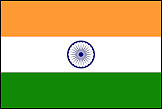
Pratibha Patil (प्रतिभा देवीसिंह पाटील, 1934 - ) wird Staatspräsidentin Indiens.
Abb.: Pratibha Patil (प्रतिभा देवीसिंह पाटील) (Mitte), 2008
[Bildquelle: rajkumar1220. -- http://www.flickr.com/photos/66555845@N00/3145815365/ . -- Zugriff am 2012-01-22. -- Creative Commons Lizenz (Namensnennung)]
2007-07-26
Premiere des Films Video Clip ( วิดีโอคลิป) von Pakphum Wonjinda (ภาคภูมิ วงศ์จินดา, 1965 - )
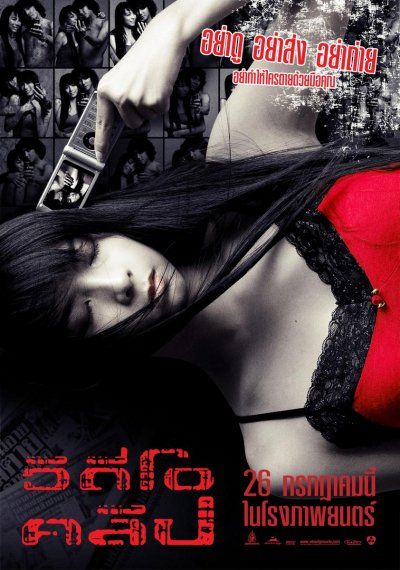
Abb.: Plakat
[Bildquelle: Wikipedia. -- Fair use]
|
"Video Clip or VDO Clip (Thai: วิดีโอคลิป) is a 2007 Thai horror film directed by Pakphum Wonjinda (ภาคภูมิ วงศ์จินดา, 1965 - ). PlotMobile phones today come with a host of novel features to entertain their users. But a dark side hides amid their use. This film features a group of people obsessed with mobile phone video recording: Ken (Paopol Thephasdin) is a mobile phone repair man who has steals private video clips from his customers phones; Pub DJ Aud (Warot Pitakanonda) likes having fun with girls and records those adventures on his phone to share with others; and Gaeng (Nuttapong Tangkasam), the pub owner who creates a porn website featuring mobile phone video clips. However, none of the characters realise their mobile phone habit is to become a threat to their lives. Cast
[Quelle: http://en.wikipedia.org/wiki/VDO_Clip. -- Zugriff am 2013-03-26] |
2007-07-29
Die Polizei stürmt das Büro der Duang Prateep Foundation (มูลนิธิดวงประทีป) von Frau Prateep Ungsongtham Hata (ประทีป อึ้งทรงธรรม ฮาตะ, 1952 - ; aka. Khru Prateep - ครู ประทีป) im Slum Khlong Toey (คลองเตย) und konfisziert 4,000 Plakate mit der Aufschrift: "Es ist nicht illegal, gegen den Verfassungsentwurf zu stimmen."
Abb.: Prateep Ungsongtham Hata (ประทีป อึ้งทรงธรรม ฮาตะ, 1952 - ; aka. Khru Prateep - ครู ประทีป)
[Bildquelle: http://dpf.or.th/en/autopagev4/show_article.php?auto_id=10. -- Zugriff am 2015-01-19. -- Fair use]
2007-08-03 - 2010-09-30

Eric G. John ist US-Botschafter in Thailand.
Abb.: Eric G. John
[Bildquelle: Department of State / Wikipedia. -- Public domain]
2007-08-05
Bangkok Post:
Frye, Erika: Dancing to a Trafficker's Tune.
Über Usbekinnen, die nach Thailand als Prostituierte gehandelt werden. Usbekinnen sind besonders beliebt bei Arabern und Afrikanern.
Abb.: Lage von Usbekistan (Ўзбекистон Республикаси)
[Bildquelle: CIA. -- Public domain]
"In recent years, this has become a sad and strangely common fate for Uzbek women, and Thailand (its discos, its prisons, its Immigration Detention Centre) a strange and sadly common stop for them. As an Anti Trafficking Project Officer with Thailand's Foundation For Women (FFW, [), Dararai Ruksasiripong interviews and identifies trafficking victims detained in Bangkok's Immigration Detention Centre (IDC), scores of whom have been Uzbek. "Almost all are trafficked," she says. "It is hard for these women to get here alone. Plus, living here is hard. They have no visa, and have to hide all the time," she says. As an example, she tells the story of Elena [Елена], a university student from Uzbekistan's capital city, Tashkent [Тошкент], who came to Thailand to earn her next year's tuition, after she was duped by the warm manner and false promises of an Uzbek woman who claimed to have secured her a job in a Thai clothing shop.
Within 72 hours of "hiring", Elena was Bangkok-bound, set upon a nightmarish journey in which, over the course of a couple months, she was forced into prostitution in Pratunam [ประตูน้ำ ], smuggled into Malaysia, and sent to Pattaya [พัทยา] to spend 5 days with a European man (from there she was able to place the phone call that led to her rescue).
Abb.: Lage von Pratunam [ประตูน้ำ ]
[Bildquelle: OpenStreetMap. -- Creative Commons Lizenz (Namensnennung, share alike)]
Abb.: Lage von Pattaya [พัทยา]
[Bildquelle: OpenStreetMap. -- Creative Commons Lizenz (Namensnennung, share alike)]Though few women are lucky enough to be rescued, Dararai says the terrifying and convoluted journey is common among victims, as is eventual arrest or detention in the IDC. Since 2004, the IDC has detained 179 and deported 193 Uzbeks, almost all of whom were women. In 2002, there were 228 cases, a number so unprecedented from the country that FFW launched a study and a public information campaign, and partnered with an Uzbek open society organisation to fight the trafficking.
Meanwhile, as richly reported in the crime pages of the Pattaya Daily News, foreign prostitutes are a common presence there. In just the past three months, police there have arrested 36 Uzbek prostitutes and conducted one questionably-ethical sting operation (netting four, according to PDN, in "Pattaya Inn Hotel, Rooms 203, 206, and 207 when the love making sessions were concluded.")"
[Quelle: Frye, Erika: Dancing to a Trafficker's Tune.. -- http://www.humantrafficking.org/updates/664. -- Zugriff am 2014-09-04]
2007-08-08 - 2007-08-18
XXIV Summer Universiade in Bangkok. Thailand gewinnt 13 mal Gold, 7 mal Silber, 10 mal Bronze und hat in der Gesamtwertung den sechsten Platz.
2007-08-19

Der Verfassungsentwurf wird in einer Volksabstimmung angenommen. In Nordostthailand stimmen allerdings 63% dagegen.
Abstimmungsergebnis:
Abb.: Abstimmungsergebnisse in Prozentzahlen der Stimmberechtigten
Wahlbeteiligung 26 Mio. 57,78% Nichtwähler 19 Mio. 42,22% Total
45 Mio. 100% Ja-Stimmen 14,73 Mio. 57,81% Nein-Stimmen 10,75 Mio. 42,19% Total
25,48 Mio 100% Ergebnis in Nordostthailand:
Ja-Stimmen 36% Nein-Stimmen 63%
Abb.: Nein-Parole, Bangkok
Bildquelle: Adaptor-Plug. -- http://www.flickr.com/photos/11401580@N03/2887210368/ . -- Zugriff am 2012-01-10. -- Creative Commons Lizenz (Namensnennung, keine kommerzielle Nutzung)]
"Referendum Campaigning Junta campaigning The Committee on Information and Public Dissemination of the Constitution Drafting Assembly led an advertising campaign to persuade voters to favour the draft constitution. Media used included all television, cable and radio stations, websites, print media outlets, government agencies, education institutions, billboards and places where crowds gather. All state-run schools and universities were involved in the campaign. Spots were aired from 6 am until 10 pm with the message "Approve: New Constitution, close to the people". Billboards saying, "Love the King. Care about the King. Vote in a referendum. Accept the 2007 draft charter." were placed throughout the Northeast.
The junta's propaganda campaign was criticized. "Broadcasting media under the control of the army and certain television stations have been misused by the state to convey false messages to persuade people to endorse the draft 2007 constitution," a statement issued by Midnight University said. The junta then agreed to a debate regarding the draft, but refused to air the debate on television, because it would create confusion among the public. A debate was later aired on Nation Channel, a subscription-only cable channel, rather than on one of the government-owned free-to-air channels.
In late July, General Sonthi (สนธิ บุญยรัตกลิน) said that if the draft constitution failed the referendum, the junta would modify the 1997 Constitution for permanent use. He also said that an election would definitely be held within 2007.
The government printed 19 million copies of the draft for public distribution prior to the referendum. However, none of the copies contained a translation into Malay, preventing people in the Malay-speaking southern provinces of Thailand from understanding the contents of the draft constitution. Despite this, eighteen Islamic organisations declared that they will accept a draft constitution and called for Muslims to also accept the draft.
Gen Sonthi has also ordered the Internal Security Operations Command (ISOC, กองอำนวยการรักษาความมั่นคงภายใน abbrev. กอ.รมน.)) to use its 700,000 nationwide staff to "promote proper understanding of the constitution" among rural people. ISOC spokesman Colonel Thanathip Sawangsaeng said provincial ISOC chiefs will use door-to-door tactics in their campaign to "educate" people so they will not be "tricked" into rejecting the draft. It was also revealed that the ISOC started their draft constitution "education" campaign in February, even before the draft constitution had been completed.
The junta also announced that it would transport people to voting stations on the date of the referendum. Interior Minister Aree Wongaraya (อารีย์ วงศ์อารยะ) insisted that it was not illegal for the Ministry to do so, adding that Prime Minister Surayud Chulanont has given his consent. In elections for the House of Representatives and the Senate, the Election Act states that it is a criminal offence to provide free transport for voters.
The junta's referendum campaign reached a peak in the final week before the referendum. On Sunday 12 August, Prime Minister Surayud Chulanont (สุรยุทธ์ จุลานนท์) led cabinet ministers, senior government officials, and 100,000 people dressed in yellow from 17 central provinces in a rally from the Royal Plaza to Democracy Monument. Similar rallies were organised simultaneously in several other major provinces. Former Thai Rak Thai member Kuthep Saikrajang claimed that people at the rally were paid between 100 and 300 Baht each to join the rally. He also claimed that the government had arranged transport to bring the people to Bangkok.
The Election Commission supported the junta's campaign. EC member Sumet Upanisakorn denied that the government acted illegally by summoning villagers to take part in a parades to accept the draft charter.
Restrictions against campaigning to reject the draftThe junta passed a law that made criticism of the draft and opposition to the constitutional referendum a criminal act. Political parties were not allowed to persuade voters to cast ballots in favour or not in favour of the constitution. Any violators could be banned from politics for 5 years and jailed for 10 years.
The restrictions against opposition to the draft were criticized by human rights bodies. Even if amended to allow for factual campaigning on the referendum, it is clear that the main purpose of the law is to intimidate and silence persons who dont share the official view, the Asian Human Rights Commission (AHRC) said. Meanwhile the administration is pumping vast amounts of money into Yes propaganda that is set to increase quickly.
The ban against campaigning against the constitution was enforced. In July, 20 soldiers and 10 policemen raided the house of a politician and seized anti-charter t-shirts, banners, documents, and recorded speeches.[52] Police also raided the Duang Prateep Foundation (มูลนิธิดวงประทีป) of former Senator Prateep Ungsongtham Hata (ประทีป อึ้งทรงธรรม ฮาตะ) and confiscated 4,000 posters which carried the message Its not illegal to vote against the draft constitution. No charges were filed. The police claimed they were acting on orders from the military. They could not cite any law to back up their actions, said Sombat Boon-ngam-anong. Prateep filed a complaint with the police, claiming that they had committed an unlawful act, citing her human rights under the abrogated 1997 constitution.
The junta also claimed to the public that general democratic elections would only occur if the draft were approved. Defense Minister Boonrawd Somtas (บุญรอด สมทัศน) told reporters that an election can take place only if the new constitution passes the referendum, implying that a a "No" would result in indefinite military rule.
Taxi-drivers were banned from putting anti-draft bumper stickers on their vehicles.
Interior minister Aree Wong-Arya has warned those campaigning against the draft by distributing leaflets to voters that they will be severely punished if there is proof against them.
On 11 August in Kamphaeng Phet province (กำแพงเพชร)), military officers raided a shop printing leaflets that attacked the draft. Eight boxes of leaflets and the printing press were seized for investigation. The raid was conducted under a government Emergency Decree.[54]
At the time of the referendum, martial law was in place in 35 provinces, intimidating those who wished to campaign against the draft.
Accusations of vote-buyingPrime Minister Surayud accused people in the Northeast of taking bribes to vote against the charter. He did not display any evidence to support his accusation or file charges against the people he claimed took or paid the money.
Constitution drafter Prasong Soonsiri and Prime Minister's Office Minister Thirapat Serirangsan both accused former members of the Thai Rak Thai party of buying "no" votes. Neither offered any evidence. The Election Commission urged Prasong to reveal the identity of the alleged vote-buyers and to file charges. Prasong refused to do so.
Democrat Party Deputy Leader Vitoon Namabutr claimed that former members of the Thai Rak Thai party were bribing people to vote against the draft with compact discs and shirts. He also did not display any evidence or file charges.
Former leaders of the Thai Rak Thai party denied the accusations.
The accusations were criticized by Matichon (มติชน), which noted in an editorial that, "Members of the public are at a loss. They don't know whether real attempts are being made to sink the charter, or is it all part of a smear campaign."
Criticisms of the referendumThe campaigning process leading to the referendum was harshly criticized. Giles Ji Ungpakorn (ใจ อึ๊งภากรณ์) of Chulalongkorn University (จุฬาลงกรณ์มหาวิทยาลัย) noted that,
It is now obvious that the military junta have no intention of conducting a clean and democratic referendum on their new constitution. While the government is shamelessly spending millions of the public's baht on propaganda urging the population to vote "yes" and accept the constitution, those who are opposed to it are prevented from campaigning properly by arrests, threats and a total lack of access in the media. The referendum cannot therefore be regarded as democratic, according to any international or Thai standards...It is necessary to remind ourselves that those in the People's Alliance for Democracy (P.A.D., พันธมิตรประชาชนเพื่อประชาธิปไตย) and those intellectuals and academics who welcomed the coup as the "only way to get rid of Thaksin's authoritarianism", used the excuse of a "dirty election" on the 2nd April 2006 to justify the coup and to justify collaborating with the junta. The present referendum is infinitely more dirty and undemocratic compared to the 2nd of April election, which was a kind of referendum on the Thaksin government. At that time we and many others were able to campaign openly for a "no" vote against Thaksin without any threats or hindrance. The press carried the views of those who opposed the government. Yet we hear no protests from the ex-members of the P.A.D. or from the pro-coup intellectuals about the way the junta's referendum is being conducted.In an editorial, the Bangkok Post noted,
[Quelle: http://en.wikipedia.org/wiki/2007_Constitution_of_Thailand . -- Zugriff am 2012-01-10]Martial law is in place across half the country. That is the harsh reality of today, and it is not an environment that would be conducive to a free and fair referendum. Any referendum carried out under the current repressive climate and alleged forced voting cannot be used to chart the path of the future of a democracy."Sticker an Bangkoker Taxis (in Thai): "I accept passengers; I don'accept the new constitution."
Wegen der geringen Zustimmung in Nordost- und Nordthailand Bildung eines staatlichen Centre for Poverty Eradication and Rural Development under the Philosophy of Self-Sufficiency Economy [เศรษฐกิจพอเพียง] unter der Führung des ISOC (Internal Security Operations Command -กองอำนวยการรักษาความมั่นคงภายในราชอาณาจักร- กอ.รมน.).
2007-08-23

Ex-Ministerpräsident Anand Panyarachun über den König:
| "The first anecdote is when I was the
chairman of the drafting committee of the 1997 constitution. There were
a few issues that I thought that he might be interested in. After
completion of the draft and after it was adopted, I had an audience with
the King, and I raised three or four issues that I thought the King
might be interested in, but he sort of brushed them aside. Of course he
was interested in the issue of whether Buddhism was to be declared a
state religion, but otherwise he did not pay much attention to what I
was reporting to him. At the end of our conversation, he said to me
"Khun Anand, it's a little odd, that in all this constitution, they lay
down that the King has to be a Buddhist. He has to be the protector of
all religions. He has to be that. He has to be this. Nowhere does it say
in this constitution that he has to be Thai". Now I challenge you, that
with 62 million Thai people, who would have the brilliance to think of
that minute technical detail?" [Quelle: http://www.nationmultimedia.com/opinion/Thais-are-more-royalist-than-the-King-30052055.html . -- Zugriff am 2013-02-05] |
2007-08-24

รัฐธรรมนูญแห่งราชอาณาจักรไทย พุทธศักราช 2550 - The Constitution of the Kingdom of Thailand 2007 (18. Verfassung)
Art:
In Kraft: 2007-08-24 -
Dauer:
aufgehoben:
2007-08-30
Premiere des Films Muay Thai Chaiya (ไชยา) von Kongkiat Khomsiri (ก้องเกียรติ โขมศิริ, 1975 - )
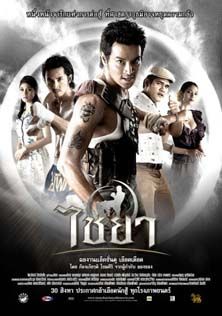
Abb.: Plakat
[Bildquelle: Wikipedia. -- Fair use]
|
"Muay Thai Chaiya or Chaiya (Thai: ไชยา) is a 2007 Thai drama film about two talented muay Thai boxers, boyhood friends whose lives take divergent paths after they arrive in Bangkok. The film is the solo directorial debut by Kongkiat Khomsiri (ก้องเกียรติ โขมศิริ, 1975 - ), who had previously been among seven directors on Art of the Devil 2 (ลองของ, 2005), and had written the screenplay for The Unseeable (เปนชู้กับผี, 2006). It premiered as the closing film at the 2007 Bangkok International Film Festival, and opened in wide release in Thailand cinemas on August 30, 2007.[1] PlotGrowing up in Chaiya (ไชยา), Surat Thani Province (สุราษฎร์ธานี), three boys, Piak (เปี๊ยก), Pao (เผ่า) and Samor (สะหม้อ), are followers of Pao's brother, Krang (Prawit Kittichanthira), a legendary muay Thai (มวยไทย) fighter who is taught by Pao's father, Tew (Samart Payakaroon). After an accident partially cripples Samor, Piak and Pao train as boxers under Tew, but the boxing school is broken up when Tew and Krang are recruited for a gym in Bangkok. Eventually, Piak and Pao go to Bangkok themselves, bringing along Samor, and Sripai, a nurse who is engaged to Piak, but whom Pao secretly loves. Piak's hot-headedness makes him a fierce fighter, but it is also a liability that costs him a fight and ends his career. He joins the world of underground bare-knuckles brawling, and he and Samor take on other jobs in the underworld as well, including helping out at go-go bar where the pretty Warn dances and seduces Piak. While working for the underworld, both of them ended up also doing dirty works for their boss. Pao, meanwhile, begins training with his father, and works his way up the ranks, is put forward as a top boxer in a match against a fierce farang (ฝรั่ง), Diamond Sullivan, which places Pao at odds with the gangsters whom Piak and Samor work for Kru Paik. Sripai later saw Piak in bed with Warn and went to find Pao. Pao and Sripai live together since while Piak took over the underground business once his boss was killed by another rival boss. Eventually the film climax at Pao's fight with Diamond. Pao was knocked down several times, but came victorious as he remembers the time three of them trained together as a young boy. Muay Chaiya StyleAlthough the film has received accolades for its action sequences, the films representation of the art of Muay Chaiya is not always accurate. The some depiction in the movie is more akin to the stadium style of Muay Thai, for example, where kicks are performed dropping one hand. A lot of the footwork doesn't utilize the yang saam khum that traditional Muay Chaiya uses. Muay Chaiya technique as espoused by the last surviving grandmaster Ajarn Ketr Siripatyai, does not resemble stadium muay thai in many regards. There were only a few authentic Muay Chaiya practitioners in the movie, one of which was (Tey) Prawit Kittichanthira who played Krangsuk. He is one of the top students in the style, and one of the few people who have proved that the style can be used in, and out of the ring. Cast
[Quelle: http://en.wikipedia.org/wiki/Muay_Thai_Chaiya. -- Zugriff am 2013-03-26] |
2007-09

Die Polizei stürmt Ranya Paew, eine Garnelen-Verarbeitungtsfabrik in Samut Sakhon (สมุทรสาคร). Sie findet ca. 800 Männer, Frauen und Kinder aus Myanmar, die hinter einer sechs Meter hohen Mauer eingesperrt sind. Bewaffnete beachen das Gelände. Die Arbeiter müssen täglich 18 Stunden arbeiten und erhalten 400 Baht pro Monat. Mit dem Monatsgehalt müssen sie dem Fabrikbesitzer ihre Nahrung bezahlen.
Abb.: Lage von Samut Sakhon (สมุทรสาคร)
[Bildquelle: CIA. -- Public domain]
"Other workers said that if they made a mistake on the shrimp peeling line, asked for sick leave, or tried to escape, they could expect to be beaten, sexually molested, or publicly tortured. After interviewing more than 280 workers, police took 63 women and three men to a shelter, suspecting that they had been trafficked and/or forced to work against their will. Another 22 were deported; nearly 80 returned to work at the factory, which remains in operation. Despite widespread worker rights abuses, including child labor and human trafficking, the owner was charged only with employing children under 15 and failing to provide holidays and time off. Though these charges are serious, they were treated as first-time labor code violations. The owner initially only paid a fine of about $2,100 and has returned to work." [Quelle: Andrew Walker: Shrimp slavery? -- http://asiapacific.anu.edu.au/newmandala/2008/04/28/shrimp-slavery/. -- Zugriff am 2014-08-29.]
2007-09
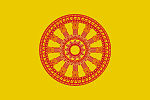

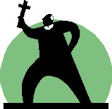
Bericht des US Departement of State zur Religionsfreiheit in Thailand:
Bureau of Democracy, Human Rights, and Labor
The law provides for freedom of religion, and the Government generally respected this right in practice; however, it does not register new religious groups that have not been accepted into one of the existing religious governing bodies on doctrinal or other grounds. In practice, unregistered religious organizations operated freely, and the Government's practice of not recognizing any new religious groups did not restrict the activities of unregistered religious groups. The Government officially limits the number of foreign missionaries that may work in the country, although unregistered missionaries were present in large numbers and were allowed to live and work freely.There was no change in the status of respect for religious freedom by the Government during the reporting period, and government policy continued to contribute to the generally free practice of religion.
There were no reports of societal abuses or discrimination based on religious belief or practice; however, in the far southern border provinces, continued separatist violence resulted in increasingly tense relations between the Buddhist and Muslim communities.
The U.S. Government discusses religious freedom issues with the Government as part of its overall policy to promote human rights.
Section I. Religious Demography
The country has an area of 198,000 square miles and a population of 64 million. According to the Government's National Statistics Office, approximately 94 percent of the population is Buddhist and 5 percent is Muslim; however, non-governmental organizations, academics, and religious groups estimated that approximately 85 to 90 percent of the population is Theravada Buddhist and up to 10 percent of the population is Muslim. There are small animist, Christian, Confucian, Hindu, Jewish, Sikh, and Taoist populations. According to the Religious Affairs Department (RAD), the numbers of atheists or persons who do not profess a religious faith make up less than one percent of the population.
The dominant religion is Theravada Buddhism. The Buddhist clergy, or Sangha, consists of two main schools, which are governed by the same ecclesiastical hierarchy. Monks belonging to the older Mahanikaya school far outnumber those of the Dhammayuttika school, an order that grew out of a 19th century reform movement led by King Mongkut (Rama IV).
Islam is the dominant religion in four of the five southernmost provinces, which border Malaysia. The majority of Muslims are ethnic Malay, but the Muslim population encompass groups of diverse ethnic and national origin, including descendants of immigrants from South Asia, China, Cambodia, and Indonesia. The RAD reported that there are 3,567 registered mosques in 64 provinces, of which 2,289 are located in the 5 southernmost provinces. According to the RAD, 99 percent of these mosques are associated with the Sunni branch of Islam. Shi'a mosques make up the remaining 1 percent.
According to RAD statistics, there are an estimated 351,987 Christians in the country, constituting 0.5 percent of the population. There are several Protestant denominations, and most belong to one of four umbrella organizations. The oldest of these groupings, the Church of Christ in Thailand, was formed in the mid-1930s. The largest is the Evangelical Foundation of Thailand. Baptists and Seventh-day Adventists are recognized by authorities as separate Protestant denominations and are organized under similar umbrella groups.
According to the most recent Government survey in 2002, there are 9 recognized tribal groups (chao khao), comprised of approximately 920,000 persons. Syncretistic practices drawn from Buddhism, Christianity, Taoism, and spirit worship are common among the tribal groups. The Sikh Council of Thailand estimates the Sikh community to have a population of approximately 70,000 persons, most of whom reside in Bangkok, Chiang Mai, Nakhon Ratchasima, Pattaya, Samui Island, and Phuket. There are 18 Sikh temples in the country. According to RAD statistics and local Hindu organizations, there are an estimated 95,000 Hindus in the country.
The ethnic Chinese minority (Sino-Thai) has retained some popular religious traditions from China, including adherence to popular Taoist beliefs. Members of the Mien hill tribe follow a form of Taoism.
Mahayana Buddhism is practiced primarily by small groups of Chinese and Vietnamese immigrants. There are more than 675 Chinese and Vietnamese Mahayana Buddhist shrines and temples throughout the country.
Religious groups proselytized freely. Monks working as Buddhist missionaries (Dhammaduta) have been active since the end of World War II, particularly in border areas among the country's tribal populations. According to the National Buddhism Bureau, as of December 2006 there are 6,458 Dhammaduta working in the country. In addition, the Government sponsored the international travel of another 1,414 Buddhist monks sent by their temples to disseminate religious information. Muslim organizations reported having small numbers of citizens working as missionaries in the country and abroad. Christian organizations reported much larger numbers of missionaries, both foreign and Thai, operating in the country.
Section II. Status of Religious Freedom
Legal/Policy Framework
The law provides for freedom of religion, and the Government generally respected this right in practice; however, it restricted the activities of some groups. On September 19, 2006, in a bloodless coup d'etat, the military overthrew the government and repealed the constitution. On October 1, 2006, the military coup leaders promulgated an interim constitution, established an interim government, and convened a Constitutional Drafting Assembly to draft a new constitution. Legal experts maintained that the interim constitution incorporates by reference many of the civil rights and protections contained in the 1997 constitution. The repealed 1997 constitution required that the monarch be a Buddhist. This provision was retained in the April 2007 first draft of the country's next constitution. The state religion in effect is Theravada Buddhism; however, it is not officially designated as such. During the reporting period, some Buddhist organizations called for the designation of Buddhism as the state religion in the new draft constitution, but as of June 2007 such a provision had not been included.
The repealed 1997 constitution stated that discrimination against a person on the grounds of "a difference in religious belief" shall not be permitted. The September 2006 interim constitution appears to retain by reference this prohibition against discrimination, and it has been included explicitly in the April 2007 draft constitution. There was no significant pattern of religious discrimination during the period covered by this report.
The repealed 1997 constitution and the interim constitution by reference provided for, and citizens generally enjoyed, a large measure of freedom of speech; however, laws prohibiting speech likely to insult Buddhism remain in place. The 1962 Sangha Act specifically prohibits the defamation or insult of Buddhism and the Buddhist clergy. Violators of the law could face up to 1 year imprisonment or fines of up to $5,800 (188,000 baht). The Penal Code prohibits the insult or disturbance of religious places or services of all officially recognized religions.
The Government plays an active role in religious affairs. The RAD, which is located in the Ministry of Culture, registers religious organizations. Under the provisions of the Religious Organizations Act, the RAD recognizes a new religion if a national census shows that it has at least 5,000 adherents, has a uniquely recognizable theology, and is not politically active. A religious organization must be accepted into an officially recognized ecclesiastical group before the RAD will grant registration. During the reporting period, there were five recognized religious groups: Buddhists, Muslims, Brahmin-Hindus, Sikhs, and Catholics. Four Protestant groups are recognized as subgroups of the Catholics. Government registration confers some benefits, including access to state subsidies, tax-exempt status, and preferential allocation of resident visas for organization officials. However, since 1984 the Government has not recognized any new religious groups. In practice, unregistered religious organizations operated freely, and the Government's practice of not recognizing any new religious groups did not restrict the activities of unregistered religious groups.
The repealed 1997 constitution required the Government "to patronize and protect Buddhism and other religions." The September 2006 interim constitution appears to retain by reference this protection for religion, and it has been included explicitly in the April 2007 draft constitution. The State subsidizes activities of the three largest religious communities (Buddhist, Islamic, and Christian). The Government allocated approximately $92.6 million (3 billion baht) during fiscal year 2007 to support the National Buddhism Bureau, which was established in 2002 as an independent state agency. The office oversees the Buddhist clergy and approved the curricula of Buddhist teachings for all Buddhist temples of educational institutions. In addition, the bureau promotes the Buddhist faith by sponsoring educational and public relations materials on the faith and practice in daily life.
For fiscal year 2006 the Government, through the RAD, budgeted $950,000 (30.8 million baht) for Islamic organizations and $88,000 (2.85 million baht) for Christian, Brahman-Hindu, and Sikh organizations.
The budgets for Buddhist and Muslim organizations included funds to support Buddhist and Muslim institutes of higher education, fund religious education programs in public and private schools, provide daily allowances for monks and Muslim clerics who hold administrative and senior ecclesiastical posts, and subsidize travel and health care for monks and Muslim clerics. Also included is an annual budget for the renovation and repair of Buddhist temples and Muslim mosques, the maintenance of historic Buddhist sites, and the daily upkeep of the central mosque in Pattani. Other registered religious groups can request government support for renovation and repair work but do not receive a regular budget to maintain religious buildings, nor do they receive government assistance to support their clergy. In 2007 the Government budgeted approximately $580,000 (18.8 million baht) for the restoration of religious buildings of religious groups, of which $362,000 (11.7 million baht) was allotted for the Muslim community, $145,000 (4.7 million baht) for the Christian, Brahmin-Hindu, and Sikh communities, and $73,000 (2.4 million baht) for special projects of all communities. Private donations to registered religious organizations are tax deductible.
Religious instruction is required in public schools at both the primary and secondary education levels. The Ministry of Education has formulated a course called "Social, Religion, and Culture Studies," which students in each grade study for one to two hours each week. The course contains information about all of the recognized religions in the country. Students who wish to pursue in-depth studies of other religions or of their belief may study at the religious schools and can transfer credits to the public school. Schools, working in conjunction with their local school administrative board, are authorized to arrange additional religious studies courses. The Supreme Sangha Council and the Central Islamic Committee of Thailand have created special curriculums for Buddhist and Islamic studies.
There are a variety of Islamic education opportunities for children. Tadika is an after-school religious course for children in grades one through six, which is under the supervision of the RAD, except for the three southern provinces of Narathiwat, Yala, and Pattani, where the courses were supervised by the Ministry of Education. The education generally takes place in a mosque. According to government statistics, as of April 2007 there were 1,618 registered Islamic Religious and Moral Education centers teaching Tadika in the 3 southern provinces, with 170,989 students and 5,749 teachers. In the remainder of the country, the RAD registered 994 centers, with 110,783 students and 2,693 teachers. For secondary school children, the Ministry of Education allows two separate curriculums for private Islamic studies schools. The first type teaches only Islamic religious courses. As of April 2007 there were 107 schools with 2,044 students and 277 teachers using this curriculum in the 3 southern provinces. The Government registers but does not certify these schools, and students from these schools cannot continue to any higher education within the country. The number of this type of school declined because students opted to attend schools that afford alternatives for higher education. The second curriculum teaches both Islamic religious courses and traditional state education coursework. As of April 2007, 144 schools with 72,618 students used this curriculum in the 3 southern provinces. The Government recognizes these private schools, and graduating students can continue to higher education within the country. A third type of Islamic education available, mostly in the southern part of the country, is that provided by traditional, privately operated religious day schools, known as pondok schools. As of April 2007, there were 328 registered pondok schools primarily in Pattani, Yala, and Narathiwat Provinces. Previously, these religious schools were not required to register with the Government and received no government oversight or funding. The registration effort began in April 2004 following an attack on a military post and arms depot in Narathiwat in January 2004. Government investigations into that incident led the authorities to pursue suspects associated with pondok schools. The total number of pondoks is still unknown. Sources believed that there could be as many as 1,000.
The Government actively sponsors interfaith dialogue. The abrogated 1997 constitution required the State to "promote good understanding and harmony among followers of all religions." This language was included in the April 2007 draft constitution. The Government funds regular meetings and public education programs. These programs included the RAD annual interfaith meeting for representatives and members of all religious groups certified by RAD. The programs also included monthly meetings of the 17 member Subcommittee on Religious Relations, located within the Prime Minister's National Identity Promotion Office (the subcommittee is composed of one representative from the Buddhist, Muslim, Roman Catholic, Hindu, and Sikh communities in addition to civil servants from several government agencies).. The RAD held an interfaith event focusing on religious youth from June 26-28 in Chonburi Province, just outside of Bangkok. Approximately 250 youth from across the country attended. In July 2006 the RAD organized another interfaith convention in Surat Thani, which had approximately 1,000 participants. The RAD sponsored a public relations campaign promoting interreligious understanding and harmony, including prime-time television announcements. However, a continuing separatist insurgency by militant ethnic Malay Muslims in the southernmost provinces led to concerns that the violence may be contributing to increased tensions between the local Buddhist and Muslim communities.
Restrictions on Religious Freedom
During the reporting period, the Falun Gong abandoned a petition challenging the Government's September 2005 denial of their application to register as an association with the Office of the National Cultural Commission. The petition was abandoned after no action had been announced on a second petition submitted to the police department to print and distribute a weekly Falun Gong magazine. The group was able to print and distribute religious materials both in Thai and Chinese on a small, informal basis for free distribution. Falun Gong maintained a website that advertises daily gatherings in Bangkok.
The Government does not recognize religious groups other than the five existing groupings; however, unregistered religious organizations operated freely.
Although unregistered missionaries were present in large numbers, the number of foreign missionaries registered with the Government is limited to a quota that originally was established by the RAD in 1982. The quota is divided along both religious and denominational lines. There were close to 1,500 registered foreign missionaries in the country, most of them Christian. During the period covered by this report, the Government increased by 10 slots its quota for Christian missionaries. In addition to these formal quotas, far more missionaries, while not registered, were able to live and work in the country without government interference. While registration conferred some benefits, such as longer terms for visa stays, being unregistered was not a significant barrier to foreign missionary activity. Many foreign missionaries entered the country using tourist visas and proselytized or disseminated religious literature without the acknowledgment of the RAD. There were no reports that foreign missionaries were deported or harassed for working without registration. Muslim professors and clerics, particularly in the far south, continue to face additional scrutiny because of continued government concern about the resurgence of Muslim separatist activities; however, this did not appear to interfere with their activities or their ability to practice their faith.
Muslim female civil servants were not permitted to wear headscarves when dressed in civil servant uniforms; however, in practice most female civil servants were permitted by their superiors to wear headscarves if they wished, particularly in the country's southernmost provinces. Muslim female civil servants not required to wear uniforms were allowed to wear headscarves.
Abuses of Religious Freedom
On April 9, 2007, in the Southern Yala Province, four Muslim youths were killed while riding in a pickup truck by what the press reported were government-backed Buddhist village defense volunteers.
There were no reports of religious prisoners or detainees in the country.
Forced Religious Conversion
There were no reports of forced religious conversions, including of minor U.S. citizens who had been abducted or illegally removed from the United States, or of the refusal to allow such citizens to be returned to the United States.
Section III. Societal Abuses and Discrimination
There were no reports of societal abuses or discrimination based on religious belief or practice; however, religious groups closely associated with ethnic minorities, such as Muslims, experienced some societal economic discrimination. Such discrimination appeared to be linked more to ethnicity than to religion. Continued violence in the far southern regions of the country contributed to negative stereotypes of Muslims held by persons from other geographic areas of the country. Killings clearly targeted at Buddhists increased ethnic tensions between Muslim and Buddhist communities in the far south.
Violent acts committed by suspected separatist militants in the Muslim-majority provinces of Narathiwat, Pattani, Songkhla, and Yala affected the ability of some Buddhists in this predominantly Muslim region to undertake the full range of their traditional religious practices. During the reporting period, 13 suspects were arrested and were in the process of being tried for the deaths of a Buddhist monk and two novices in an October 2005 attack on a Buddhist temple in Pattani Province.
There were almost daily attacks by suspected separatist militants in the country's southernmost provinces on both government officials and Buddhists and Muslim civilians. On March 14, 2007, assailants ambushed a van in Yala Province killing eight Buddhist passengers including two teenage girls. That evening, 2 bombs exploded outside a nearby mosque and teashop, killing 3 Muslims and injuring 20. On March 19, 2007, gunmen killed three Muslim students and injured seven others at an Islamic boarding school in Songkhla Province. The violence contributed to an atmosphere of fear and suspicion in the southern provinces. As a result of a series of increasingly provocative attacks, the level of tension between the local Muslim and Buddhist communities continued to grow. Government officials and observers expressed concern that the violence could result in open communal conflict.
On October 11, 2006, a monk was injured by a bomb in Narathiwat Province. Three others were injured in a separate incident on October 23. The monks were performing the morning ritual of receiving donations of food and were guarded by three armed soldiers, one of whom subsequently died from the explosion.
At the end of the reporting period, no one had been arrested for the 2004 killing of three Buddhist monks and the beheading of one civilian Buddhist rubber tapper, or for the 2004 attacks on Buddhist temples and one Chinese shrine in the southern provinces of the country. The Government continued to investigate these incidents in the context of security operations involving the ongoing separatist violence in the South. Buddhist monks continued to report that they were fearful and thus no longer able to travel freely through southern communities to receive alms. They also claimed that laypersons sometimes declined to assist them in their daily activities out of fear of being targeted by militants. In response to the killings, the Government stationed troops to protect the religious practitioners and structures of all faiths in communities where the potential for violence existed and provided armed escort for Buddhist monks, where necessary, for their daily rounds to receive alms.
Section IV. U.S. Government Policy
The United States Government discusses religious freedom issues with the Government as part of its overall policy to promote human rights. U.S. Embassy officers regularly visit Muslim religious leaders, academics, and elected officials as part of the Embassy's goal of understanding the complex ethnic and religious issues at play in society. In July 2006 the Embassy hosted a speaker program on Muslim life in America designed to share peaceful strategies for dealing with religious and cultural diversity, to strengthen civic tolerance, and to discuss the importance of religious freedom, among other goals.
During the fiscal year 2006, nine Muslims from a broad range of professions participated in the International Visitor Leadership Program. During their visits to the United States, they had the opportunity to observe individuals from all religious groups openly practice their faith freely and without conflict."
[Quelle: http://www.state.gov/g/drl/rls/irf/2007/90155.htm . -- Zugriff am 2011-11-14]
2007-09


Bloomber News (USA); Thailand's royal moneymaker : King Bhumibol Adulyadej attract6s investors to a country reeling from its 18th coup since the World War II. The $5 billion of shares he controls have outperformed the beaten-down Thai stock market / von Williem Mellor
Danach besitzt der König
- 5260 Hektar Grundbesitz (fast 53 km²)
- davon ca. 1.200 Hektar (12 km²) in Bangkok und Umgebung, manche davon $30 Mio. pro Hektar wert: zum Grundbesitz in Bangkok gehören:
- Central World (เซ็นทรัลเวิลด์)
- Suan Lum Night Bazaar (สวนลุมไนท์บาซาร์)
- ein großer Teil der Ratchadamnoen Avenue (ถนนราชดำเนิน)
- Four Seasons Hotel (โรงแรม โฟร์ซีซั่น)
- Dusit Thani Hotel (โรงแรม ดุสิตธานี)
- 87% der Anteile der Kempinski-Hotel-Kette
- 30% der Anteile an Siam Cement Group Pcl. (บริษัท ปูนซิเมนต์ไทย จำกัด)
- 21% der Anteile an Siam Commercial Bank Pcl. (ธนาคาร ไทยพาณิชย์)
- Anteile an Minor International (der König ist fünftgrößter Anteilseigner)
- Verschiedene kleinere Beteiligungen
2007-09
In Bangkok wird die Kennzeichnung von Hunden mit Mikrochips obligatorisch.
Abb.: Mikrochip-Transponder mit Applikator
[Bildquelle: Uwe Gille / Wikipedia. -- GNU FDLicense]
Abb.: Hat er wohl einen Mikrochip?, Bangkok, 2009
[Bildquelle: K.rol2007. -- http://www.flickr.com/photos/21086912@N06/3918759805/ . -- Zugriff am 2012-10-07. -- Creative Commons Lizenz (Namensnennung)]
"It is estimated that there are over 120,000 stray dogs in Bangkok, Thailand.[1][2] The management of "soi dogs" has become a serious problem in the capital. Status
Most of the 120,000 stray dogs in Bangkok are not aggressive, and many have been injured in traffic.[3] However, strays occasionally attack people, and few have been vaccinated against canine diseases.[2]
ManagementIn the 1990s, more than 200 dogs were euthanized each day. In 1998, however, the Society for the Prevention of Cruelty to Animals campaigned against the practice, which they argued violated Buddhist principles. The campaign generated substantial public outcry against the euthanization of dogs, and the city adopted a pro-life dog policy.
A recent regulation has forbidden the feeding of stray dogs in public places.[4]
In September 2007, the Bangkok Metropolitan Administration (กรุงเทพมหานคร) began a program of mandatory registration for dogs;[5] the program was aimed to deter the abandonment of dogs, which could be traced to their owners.[2] Requirements for such registration include the implantation of a microchip identifying the owner, rabies vaccination for dogs less than one year old, and sterilization;[6] dog owners were required to register their pets before July 2008.[5] Starting on July 4, 2008, dogs found unregistered may be sent to a dog kennel in the northern province of Uthai Thani (อุทัยธานี) and their owners may be fined up to 5,000 baht.[5] Critics of mandatory registration have asserted that it has actually increased the number of strays, as dog owners who do not wish to pay for implementation are abandoning their pets rather than risking receiving fines.[4]
Before prominent events, stray dogs have been rounded up and sent to shelters. This occurred before the 2003 Asia-Pacific Economic Cooperation, when thousands of dogs were removed from the city and sent to the Livestock Development Department's animal quarantine stations in Phetchaburi (เพชรบุรี) and Sa Kaeo (สระแก้ว) provinces.[1][3] Stray dogs were again transported from the city in preparation for the king's 2006 anniversary celebration, with efforts focusing on areas near expensive hotels where royal guests stayed.[7] These strays were sent to the kennel in Uthai Thani, where it was planned they would stay until their death.[7]
In popular cultureThe 2006 Thai movie Kao Niew Moo Ping by Siwaporn Pongsuwan focused on the relationship between a runaway girl and the stray dog she befriends."
[Quelle: http://en.wikipedia.org/wiki/Stray_dogs_in_Bangkok . -- Zugriff am 2012-10-07]
2007-09-02
Makkhawan Brücke (สะพานมัฆวานรังสรรค์): Gewaltsamer Zusammenstoß von Anhängern der United Front for Democracy Against Dictatorship (UDD, แนวร่วมประชาธิปไตยต่อต้านเผด็จการแห่งชาติ - นปช., Rothemden - เสื้อแดง) und der People's Alliance for Democracy (PAD, พันธมิตรประชาชนเพื่อประชาธิปไตย - Gelbhemden - เสื้อเหลือง).
Abb.: Lage der Makkhawan Brücke (สะพานมัฆวานรังสรรค์)
[Bildquelle: OpenStreetMap. -- Creative Commons Lizenz (Namensnennung, share alike)]
2007-09-13
Premiere des Films Bangkok Love Story (เพื่อน...กูรักมึงว่ะ) von Poj Arnon (พจน์ อานนท์)
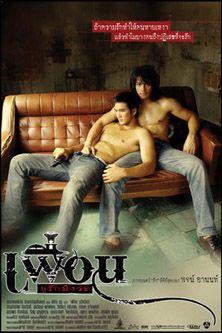
Abb.: Plakat
[Bildquelle: Wikipedia. -- Fair use]
|
"Bangkok Love Story (Thai: เพื่อน...กูรักมึงว่ะ; RTGS: Phuean...Ku Rak Mueng Wa; literally "Friend ... I love you") is a 2007 Thai film written and directed by Poj Arnon (พจน์ อานนท์). A gay romantic crime action drama, it is the story of a man who falls in love with a gunman assigned to kill him. PlotA loner gunman named Maek (เมฆ) is assigned to kidnap a police informant named Iht (อิฐ), but Maek has a change of heart when he takes Iht to the 'hit house'. Maek is ordered to kill Iht, but because he only kills scum and has discovered that Iht isn't bad, he refuses, turning the gun on the enforcers who had hired him to murder Iht. A gun battle ensues during which Maek is wounded, but Iht grabs Maek's gun and shoots their way out of the mobsters' headquarters. The two men then escape on Maek's motorcycle. Maek tells Iht to leave at gun point but he won't and takes Maek back to his rooftop hide-out. There, over a period of time, Iht tends to Maek's wound and finds himself attracted to him. In fact, Maek is also attracted to Iht, but keeps it hidden, while Iht cares for his former would-be killer with great tenderness. While giving Maek a bath one day, Iht kisses him on the mouth. Maek reciprocates and the two men engage in a passionate sexual experience. The next day, however, a conflicted Maek demands that Iht go away and leave him alone. Iht returns home to his fiancee, Sai (ทราย), but is no longer interested in continuing a relationship with her. Iht spends his days pining over Maek, and tracks down Maek's brother, Mhok (หมอก) , and their mother. Mhok is HIV positive, as the result of sexual abuse by his and Maek's stepfather, and their mother is dying of AIDS. Maek remains elusive, hiding from Iht when he visits the hideout, but leaving signs that he's there so Iht will return. Though Maek avoids making contact with Iht, eventually he goes to visit his mother and brother, and Iht corners him at the entrance to the building, declaring his love for Maek and stressing how much he misses him. They kiss passionately. They are unfortunately covertly observed by Sai, Iht's live-in fiancee. Maek's dream is to take his mother and brother away from Bangkok to the mountains of Mae Hong Son Province (แม่ฮ่องสอน). But after Maek's mother overhears that Mhok has prostituted himself to survive after contracting AIDS from his stepfather, she commits suicide by hanging herself. The brothers take her down, and as they are rushing her from the apartment, she is killed by a gunshot fired by an unseen sniper. The bullet is presumably intended for Maek. Maek's former mobster employers are gunning for him and Iht. Maek decides to hunt them down first, and he succeeds in killing them. After Mohk informs Iht what Maek is doing, Iht goes to the capo's house to try to stop Maek, but he is too late and misses Maek by a second. Iht is injured when the capo's wife shoots at a clock that shatters in Iht's face. Maek, meanwhile meets his brother at the railway station to leave Bangkok for good. But before he can board the train, he is apprehended by the police and taken away. Mhok breaks down. He's the sole witness to his brother being apprehended. Years pass by. Iht visits Maek in prison and reveals that he was left blind in the final gunbattle with Maek's ex-boss. Mhok commits suicide while at a Hospice of Wat Phrabaht Namphu (วัดพระบาทน้ำพุ) in Lopburi (ลพบุรี) ) because he no longer has the energy to fight his disease. Eventually, Maek is released from prison, and Iht meets him. But before the two men can leave to start their life together, Maek is shot dead by a single bullet fired by an unseen assassin. A bewildered, blind Iht collapses over his lover's corpse, swearing his love for him again and again. Iht eventually regains his sight, and is finally able to view on his mobile phone a video recorded by Maek himself many years before, admitting that all along, he had loved Iht and that he would love him to his last breath. Cast
When Bangkok Love Story was in pre-production in 2006, the Royal Thai Police (ตำรวจแห่งชาติ) raised objections to the script, which originally depicted a policeman (Iht) falling in love with the assassin Maek. The character Iht's exact connection to the police department was then made ambiguous so that the film would be passed by the Board of Censors, which includes members of the Royal Thai Police." [Quelle: http://en.wikipedia.org/wiki/Bangkok_Love_Story . -- Zugriff am 2013-03-25] |
2007-09-13

Der Anthropologe und Archäologe Prof. Srisakra Vallibhotama [ศรีศักร วัลลิโภดม, 1938 - ] erhält den japanischen Academic Fukuoka Asian Culture Prize (福岡アジア文化賞).
Abb.: Srisakra Vallibhotama [ศรีศักร วัลลิโภดม], 2010
[Bildquelle: Looknarm / Wikimedia. -- GNU FDLicense]Begründung:
"Professor Srisakra Vallibhotama [ศรีศักร วัลลิโภดม, 1938 - ] is one of the leading anthropologists and archaeologists in Thailand and the whole of Southeast Asia. Through his comprehensive approach combining expertise in anthropology, archaeology, history and folklore, and with a local approach to historiography, he has presented Thai history in an entirely new light. In his research, he criticized the prevalent academic attitude of uncritical acceptance of Western scholarship, and expressed his doubts about the conventional interpretation of Thai history which mainly followed the national and royal chronicles. Instead of focusing exclusively on the nation-centred history, he used the results of his energetic field surveys and investigations into local history. These led him to a new perspective on Thai history. His research has covered many areas, but particular mention should be made of his archaeological survey of prehistoric Northeast Thailand, and his research into Thai ancient cities and states. In the former project, having made thorough inventories during field surveys, he argued the significance of agriculture, salt and iron, and demonstrated that religious worship had existed there from prehistoric times by using the Sema Stone [ใบเสมา] (peculiar to the Northeastern part of Thailand) as evidence. These findings refuted the old image of the poor Northeast, and gave a new profile to the region as the once rich Northeast. Some of the archaeological data that Professor Srisakra collected from this region has been made available through the internet, and has received international acclaim. In the latter project, by making full use of aerial photography, he uncovered the urban planning and structures of several ancient cities, including the first city state, Dvaravati [ทวารวดี], and those of the Sukhothai [สุโขทัย] and Ayutthaya [อยุธยา] dynasties. He argued for a strong influence of Southeast Asian trade on the establishment of cities and states in ancient Thailand.
After graduating from Chulalongkorn University [จุฬาลงกรณ์มหาวิทยาลัย], Professor Srisakra studied anthropology at the University of Western Australia. He engaged in teaching and research at the Department of Anthropology in the Faculty of Archaeology at Silpakorn University [มหาวิทยาลัยศิลปากร], while holding important positions in a number of academic/research institutions. He made many crucial recommendations to the government when he chaired several committees working for cultural property conservation, including one for the Sukhothai Historical Park [อุทยานประวัติศาสตร์ สุโขทัย] Development Project, for which he was the Chief Social Scientist. He has been an active scholar, as is shown in his efforts to publicize academic research to a wider public as editor of Muang Boran Journal [วารสารรายสามเดือน], a leading quarterly on Thai archaeology and history.
His research and his other activities, founded upon a unique anthropological point of view which is solidly based on archaeological data, has successfully reconstructed a part of Thai and Southeast Asian histories, focusing on local history and the environment. For his significant achievement, Professor Srisakra fully deserves the Academic Prize of the Fukuoka Asian Culture Prizes [福岡アジア文化賞]."
[Quelle: http://asianmonth.com/prize/english/winner/18_02.html. -- Zugriff am 2015-07-05]
2007-09-20


Bericht des US-Botschafters Ralph Leo "Skip" Boyce (1952
- ) an das State Departement in Washington DC:
"SCANDALOUS VIDEO 7. (C) A disturbing video of the Crown Prince and his wife is in wide circulation here, after being posted on website VEOH.com (http://www.veoh.com/watch/v2000579385DSyC7f). The video, which is reportedly several years old, shows the CP and his wife at a birthday party in a garden after dark. The wife is wearing nothing but a G-string and a smile as she lights the birthday candles. The video shows servants waiting on the table, and the flash of photographs being taken. According to a number of contacts, this is being passed around on DVD, both in Bangkok and in the provinces; the tawdry incident has provoked more (but whispered) criticism of the CP."
2007-09-20
Es erscheint:
สุฌิสา เลิศภควัต [Sunisa Lertpakawat; aka: หมวด เจี๊ยบ - Muad Jeab (Lieutenant Jeab)]: ทักษิณ where are you?. -- กรุงเทพฯ : นอกโลก, 2550 [=2007]. -- 235 S. -- ISBN 9747512548
Das Buch beschreibt den Alltag von Thaksin Shinawatra im Exil in London.
Die Autorin, die im Sekretariat der Armee tätig ist, bekommt deswegen große Schwierigkeiten mit ihren Vorgesetzten in der Armee.
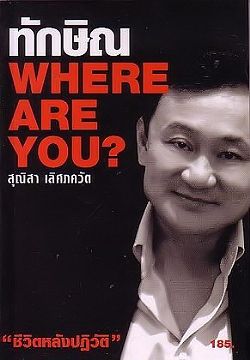
Abb.:
Einbandtitel
2007-09-26


Birmanisches Militär geht in Yangon (ရန်ကုန်, Myanmar) gewaltsam gegen demonstrierende buddhistische Mönche und andere Oppositionelle vor. Anlass der Proteste waren starke Preiserhöhungen bei Kochgas und Benzin.
Abb.: Lage von Yangon (ရန်ကုန်, Myanmar)
[Bildquelle: OpenStreetMap. -- Creative Commons Lizenz (Namensnennung, share alike)]
2007-09-26

Yasuo Fukuda (福田 康夫, 1935 - ) wird Ministerpräsident Japans.
Abb.: Yasuo Fukuda (福田 康夫), 2008
[Bildquelle: Remy Steinegger / World Economic Forum. -- http://www.flickr.com/photos/worldeconomicforum/2297266534/ . -- Zugriff am 2012-01-20. -- Creative Commons Lizenz (Namensnennung, share alike)]
2007-09-28
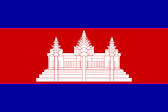
Es erscheint:
Exploitation of Cambodian men at sea. -- Phnom Penh : Strategic Information Response Network (SIREN), 2007-09-28. -- Online: http://www.no-trafficking.org/reports_docs/siren/SIREN%20CB-02%20Exploitation%20of%20Cambodian%20men%20at%20sea.pdf. -- Zugriff am 2014-08-27
"In April 2007, a group of ten men and one boy from Kandal province [កណ្ដាល] (ranging from 15 to 33 years in age) were recruited for work on fishing boats in Thailand by a local informal broker in their district. In their village in Sa-ang [S'ang; ស្រុកស្អាង] district, there are few livelihood alternatives to fishing for young men.
Abb.: Lage des S'ang Distrikts [ស្រុកស្អាង]
[Bildquelle: OpenStreetMap. -- Creative Commons Lizenz (Namensnennung, share alike)]Compounding the lack of opportunities are concerns now that fishing stocks are being depleted, an increasing population is living from those resources, and a recently introduced policy, which prohibits the farming of the lucrative striped snakehead fish. Additionally, in April, when the water is low, there is little for the men to do to earn a living for themselves and their families.
In the search for work, leaving the province also offers few options for men. Factory work is difficult to get, as employers prefer females who are considered less likely to demand their workplace rights. While they had heard some stories of severe exploitation on boats in Thailand, these were few. There were cases from within the village of men leaving for Thailand and falling out of touch, but it was assumed that the reason was that they were successful and had no reason to call home. The combination of these factors in the case of the eleven Kandal [កណ្ដាល] males made the brokers offer appealing.
Crossing the border covertly in Poipet [ក្រុងប៉ោយប៉ែត
], the group of eleven walked overnight to reach vehicles on the Thai side, as instructed by a contact in Poipet. The vehicle drove them on to Songkhla [สงขลา], where they were put almost directly onto a boat. While they had heard stories of abuse on some boats leaving from Thailand, they felt confident that by staying together as a group they would be safe. Songkhla is a deep-sea port, accommodating fishing vessels that spend long terms at sea. They were told that they would work for two years on the boat and be paid after that time.
Abb.: Lage von Poipet [ក្រុងប៉ោយប៉ែត] und Songkhla [สงขลา]
[Bildquelle: OpenStreetMap. -- Creative Commons Lizenz (Namensnennung, share alike)]On the fishing boat, the group of eleven from Kandal was part of a fishing crew of 27 Cambodian males, with six Thais, plus the Thai captain. The crew worked long hours, getting as little as two hours sleep a day. They had insufficient food and there was no medicine for those who fell sick. Physical and verbal abuse was frequent, and some of the Thai crew was armed. One Cambodian man whose leg became swollen, making it difficult to stand, was beaten and forced to continue working. The Cambodian crew was told by other Cambodians on passing ships that their boat had earned a bad reputation for selling their crew and cheating their crew out of their pay at the end of the two years. Indeed, they eventually came to understand that they had been sold onto the boat.
After more than a month on the boat, they knew they would not be able to endure two years. They were desperate to escape, but being at sea left the Cambodian crew with few options. Asking Cambodian crews on the other boats how to return to land, they were told they would have to engineer some scheme, such as sabotage the engine, so as to force the boat to shore. The youngest member of the group took the initiative and, was successfully able to force the boat to dock. According to the group this was an extremely risky endeavor that would have endangered their lives had it been detected. Fortunately it was not, and the boat was forced to return to shore to be fixed.
Once back on shore in Thailand, the men were given 500 baht each and told to wait around the dock for the boat to be fixed. However, they were desperate to return home and fearful of being placed on another boat by the same Thai boat owner, so they borrowed a mobile phone to call their parents, who then contacted their original local broker. Their parents were told that they would have to pay 3,500 baht (approximately USD$100) each for their return home. While they initially agreed to pay this amount, this fee was soon increased to 6,500 baht, which they could not afford. The parents informed their sons of this as well as the broker, and the broker told them the group would be arrested if they did not pay.
The families contacted Cambodian NGOs LICADHO and LSCW, who then followed up on the groups situation through their networks in Thailand. They also reported the case to the Commune Police Chief, who fed the case up to the Central Police through the provincial level.
In Thailand, after hearing that their parents could not afford the brokers increased price, the group sought other options and decided that being deported was the cheapest, quickest, and safest way home. Thus, they gave themselves up to police and were placed in detention in Sadao [สะเดา], Songkhla, then transported by Thai immigration officers to the Poipet [ក្រុងប៉ោយប៉ែត] border crossing, where they were met and finally brought home by their families. The Kandal-based recruiter has since been arrested, and is in detention and awaiting trial. However many villagers are unsure if she was aware of the conditions that the men found themselves in. The employer and brokers on the Thai side have not received any penalty and have not been investigated."
Abb.: Lage von Sadao [สะเดา]
[Bildquelle: OpenStreetMap. -- Creative Commons Lizenz (Namensnennung, share alike)][Quelle: Exploitation of Cambodian men at sea. -- Phnom Penh : Strategic Information Response Network (SIREN), 2007-09-28. -- Online: http://www.no-trafficking.org/reports_docs/siren/SIREN%20CB-02%20Exploitation%20of%20Cambodian%20men%20at%20sea.pdf. -- Zugriff am 2014-08-27]
N
2007-10-01 - 2010-09-30
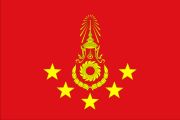
General Anupong Paochinda (พลเอก อนุพงษ์ เผ่าจินดา, 1949 - ) ist Commander-in-Chief of the Royal Thai Army (ผู้บัญชาการทหารบก).
Abb.: Anupong Paochinda (พลเอก อนุพงษ์ เผ่าจินดา)
[Bildquelle: The Official Site of The Prime Minister of Thailand Photo by พีรพัฒน์ วิมลรังครัตน์. -- https://www.flickr.com/photos/40561337@N07/4584451753/. -- Zugriff am 2015-06-07. -- Creative Commons Lizenz (Namensnennung)]
2007-10-04
Premiere des Films Body (บอดี้..ศพ #19) von Paween Purijitpanya (ปวีณ ภูริจิตปัญญา, 1978 - )
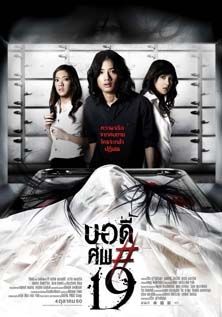
Abb.: Plakat
[Bildquelle: Wikipedia. -- Fair use]
|
"Body (Thai: บอดี้..ศพ #19 or Body ... Sop 19, literally "corpse number 19") is a Thai horror-thriller film. It is produced by GTH (จีเอ็มเอ็ม แกรมมี่), the same production company that made the hit Thai horror film, Shutter (ชัตเตอร์ กดติดวิญญาณ, 2004). Body is directed by Paween Purijitpanya (ปวีณ ภูริจิตปัญญา, 1978 - ) and co-written by Chukiat Sakweerakul (ชูเกียรติ ศักดิ์วีระกุล, 1981 - ), who had previously directed the thriller, 13 Beloved (13 เกมสยอง, 2006). Body has parallels to an actual murder case in Thailand, in which a physician was convicted and given the death penalty in the dismemberment of his estranged wife. Among the cast is Arak Amornsupasiri (อารักษ์ อมรศุภศิริ, 1984 - ) , who plays the main protagonist Chon (ชล). Arak is the guitarist in the Thai rock band, Slur (สะเลอ). PlotChon (ชล) is an engineering student living in a rented house in Bangkok with his sister, Aye (เอ๋). Chon is having bad dreams, in which he is visited by a ghostly woman who appears to have been dismembered and put back together. He also sees a misshapen black cat and occasionally sees a fetus. Chon sometimes finds himself in places, such as a musical performance, and cannot remember how he got there. After Chon slices his finger open while cleaning some prawns for dinner (the prawns had started moving around and bleeding profusely), Chon's medical student sister Aye takes him to the hospital. Chon is eventually referred to a Dr. Usa (อุษา) for psychiatric treatment. It becomes apparent to Dr. Usa that there is some connection between Chon, herself and her increasingly distant husband, Dr. Sethee. In the course of Usa's investigation, she discovers there is a connection between her husband and a mysterious university lecturer, Dr. Dararai (ดาราราย), who possesses supernatural powers of hypnosis. Meanwhile, Chon continues to have bad dreams, and they are becoming increasingly horrifying and real. He is repeatedly drawn to a spare room in his house, and when he opens the door, he sees a man chopping up a body. When the man turns his head to look at Chon, the man's face is Chon's. It turns out to be another dream and after discovering that Dararai has gone missing he realises that Dararai is dead and communicating with him, Dararai asks him to find her. A teaching assistant whom Usa questioned about Dararai ends up being killed in a gruesome accident involving barbed wire around a university museum exhibit. A young doctor also meets his end in a vat of acid after talking to Chon about Dararai. Chon comes to the conclusion that whoever tells of Dararai's disappearance is killed and tries to stop the killings, but is always too late. Back at their rented house Chon is being tormented by Dararai again who constantly says "find me" and now discovers a secret room in the house (the one in his dreams) which he suspected earlier behind a cupboard and discovers burnt photos of Dararai and Sethee in what seems to be an intimate relationship. It now emerges that Sethee had an affair with Dararai and that Dararai took photos of themselves in bed with each other. Dararai wanted to blackmail Sethee with the photos or tell Usa and as a result Sethee met up with Dararai, drugged her drink, injected her with a paralysing liquid and chopped her to pieces (in the hidden room that Chon finds). Chon is about to tell Usa that her husband has killed Dararai but while at her house he is again attacked by Dararai's ghost who says she will kill his sister, enraged Chon stabs her with a pole in front of Usa and Sethee's daughter May. After seeing May (who's scared and terrified) he leaves to find his sister. These events between Usa, Chon, Sethee and Dararai(and her ghost) lead to the university hospital's morgue, and body number 19. Chon goes to the morgue and discovers that the body in the morgue, which is in drawer 19, is actually Chon's body. Chon has, in fact, died a couple of years ago and Sethee who has a multiple personality disorder believes that he is Chon when in reality he has killed the teaching assistant, the doctor and has stabbed his own wife Usa who he believed was Dararai's ghost when he was believing he was Chon. He is arrested but because of his mental health issues his trial is put on hold. A flashback occurs back to the scene when he is about to drug Dararai's drink. Its revealed that Dararai was aware that Sethee has drugged her drink hypnotises him and gives him a multiple personality disorder. The flashback finishes and he is being escorted to prison in a van with his Lawyers in the van(to protect his safety). He escapes out of the van and runs from the police and lawyers, He runs in front of another van that is carrying metal poles on top. The van stops in time and doesn't run over Sethee but the metal poles are flung off the van and they all hit and impale Sethee. He is left on the road with lots of metal poles pieced inside him. The last scene shows Sethee in hospital being operated on, he is unconscious but suddenly Dararai's ghost appears and it turns out her ghost wasn't part of Sethees mental mind but was real and was manipulating Sethee. She finally reveals that she forgives him and after clicking her fingers his mind goes back to normal but this makes Sethee conscious again and wakes him up halfway through his operation leaving him screaming in pain as Dararai disappears and the ending credits show. Cast
[Quelle: http://en.wikipedia.org/wiki/Body_%282007_film%29 . -- Zugriff am 2013-03-25] |
2007-10-10
Tod von Luang Phor Panyanantha (พระพรหมมังคลาจารย์ aka ปั่น ปัญญานันโท), geb. 1911), seit 1960 Abt des Wat Cholprathan Rangsarit (วัดชลประทานรังสฤษดิ์) in Nonthaburi (นนทบุรี).
Abb.: Lage von Nonthaburi (นนทบุรี)
[Bildquelle: OpenStreetMap. -- Creative Commons Lizenz (Namensnennung, share alike)]
Abb.: Luang Phor Panyanantha (พระพรหมมังคลาจารย์ aka ปั่น ปัญญานันโท), 1968
[Bildquelle: 2T / Wikipedia. -- Creative Commons Lizenz (Namensnennung, share alike)]
2007-10-23
Premiere des Films Opapatika (โอปปาติก เกิดอมตะ) von Thanakorn Pongsuwan (ธนกร พงษ์สุวรรณ)
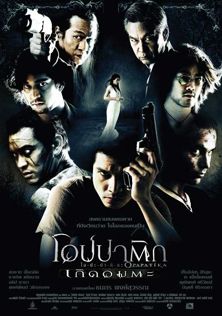
Abb.: Plakat
[Bildquelle: Wikipedia. -- Fair use]
|
"Opapatika (Thai: โอปปาติก เกิดอมตะ) is a 2007 Thai fantasy-action film. It is directed by Thanakorn Pongsuwan (ธนกร พงษ์สุวรรณ) and stars Pongpat Wachirabanjong (พงษ์พัฒน์ วชิรบรรจง, 1961 - ), Leo Putt (ลีโอ พุฒ, 1976 - ), Somchai Kemklad (สมชาย เข็มกลัด, 1974 - ), Chakrit Yaemnam (ชาคริต แย้มนาม, 1976 - ), Ray MacDonald (เรย์ แมคโดนัลด์, 1977 - ), Athip Nana (อธิป นานา), Nirut Sirichanya (นิรุตติ์ ศิริจรรยา, 1947 - ) and Khemupsorn Sirisukha (เข็มอัปสร สิริสุขะ, 1980 - ) Plot A narrator explains that according to Buddhist belief the evolution of birth can be divided into three forms:
Then there is a fourth form, Opapatika (โอปปาติก), which goes against Buddhist beliefs because it involves suicide: a class of supernatural beings who are born out of suicide. However, the powers that they gain also have a negative effect. The narrator, it is revealed, is Thuwachit (ธุวชิต) (Pongpat Wachirabanjong), the loyal mortal henchman for the elderly Sadok (ศดก) (Nirut Sirichanya), an Opapatika who is quickly decaying and needs to feast on the flesh of other Opapatikas in order to sustain himself. He sends Thuwachit out to capture others. Four Opapatikas remain:
Investigating the Opapatikas is a private detective, Techit (เตชิต ) (Leo Putt), whom Sadok transforms into an Opapatika. Techit has the psychic powers of a mind reader, but his power costs him the use of his five senses. Techit is teamed up with Thuwachit, who leads a vast paramilitary army against the four Opapatika. The four immortals are also mysteriously drawn to a woman, Pran (ปราณ ) (Khemupsorn Sirisukha). ReceptionBox office Opapatika opened on October 23, 2007 in Thailand cinemas. It was the No. 1 movie at the domestic box office for two weeks, earning US$1,091,851 during that time.[2] [Quelle: http://en.wikipedia.org/wiki/Opapatika. -- Zugriff am 2013-03-26] |
2007-10-23
Eröffnung des Antique Phonograph & Grammophone Museum in Bangkok.
2007-11

König Bhumibol trägt bei seiner Entlassung aus dem Krankenhaus eine rosarote Jacke. Daraufhin beginnen königsbegeisterte Thais statt Gelb Rosa zu tragen. Die Geschäfte können mit der Nachfrage nach rosa Kleidung kaum nachkommen. Am meisten gefragt sind rosa T-Shirts aus den von Prinzessin Sirindhorn (มหาจักรีสิรินธร, 1955 - ) geförderten Phufa-Shops (ร้านภูฟ้า): im November verkauft Phufa 40.000 solcher T-Shirts. Für Dezember sind 20.000 nachbestellt
Abb.: Rosarot wie der König. Bangkok, 2007-11-10
[Bildquelle: Frédéric Gloor. -- http://www.flickr.com/photos/fredalix/2738338099/ . -- Zugriff am 2012-01-10. -- Creative Commons Lizenz (Namensnennung, keine kommerzielle Nutzung, share alike)]
2007-11-01
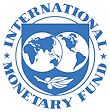
Dominique Gaston André Strauss-Kahn (1949 - ) wird geschäftsführender Direktor des Internationalen Währungsfonds (IMF).
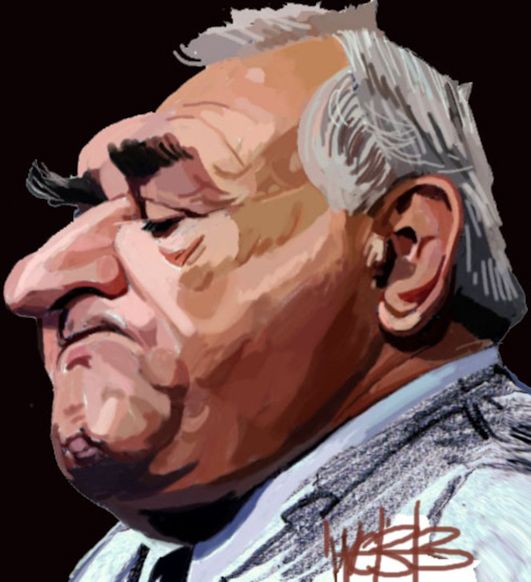
Abb.: Dominique
Gaston André Strauss-Kahn / von Murray Webb (1947 - ), 2011
[Bildquelle:
Dominion post (Newspaper). Webb, Murray, 1947- :Dominique Strauss-Kahn. 17
May 2011. Webb, Murray, 1947- :[Digital caricatures published from 29 July 2005
onwards (2006, 2007, 2008). Includes a selection of digital caricatures
published from 2002 and up to July 2005.]. Ref: DCDL-0017868. Alexander Turnbull
Library, Wellington, New Zealand.
http://natlib.govt.nz/records/22298304 .
-- Zugriff am 2013-03-09. -- "You can copy this item for personal use, share it,
and post it on a blog or website. It cannot be used commercially without
permission"]
2007-11-14

Bericht von US-Botschafter Ralph Skip Boyce (1952 - ) an das Sate Departement in Washington DC:
| "SUBJECT: NLA [National Legislative Assembly
-สภานิติบัญญัติแห่งชาติ] MOVING QUICKLY ON WIDE-RANGING INTERNAL
SECURITY ACT [...] ISA MOVING QUICKLY2. (U) The National Legislative Assembly (NLA) [สภานิติบัญญัติแห่งชาติ] November 8 passed the draft Internal Security Act [ISA - กฎหมายความมั่นคงภายใน] through the first reading by a margin of 101 votes for, 20 against, and 2 abstentions. The draft ISA had been scheduled for action in the NLA on November 7, but the first reading was re-scheduled without explanation. Thai Cabinet had approved the draft October 16. The Act will now move to an ad hoc committee for consideration of amendments. 3. (C) According to the committee rules provided to us by a member of the National Legislative Assembly, members of the Assembly will be permitted seven days to submit amendments of the draft to the committee. The rules permit the committee to spend two to three weeks considering the bill and amendments to the bill before returning the Act to the Assembly for second and third readings. The second reading will allow NLA members the opportunity to debate the bill article by article while the third reading would be the final vote on the Act. The NLA member predicted the bill would leave the committee in time for the NLA to vote on the draft on November 29. 4. (C) Of the twenty-four members of the committee, ten will be former senior military officers, six academics known to be pro-military and four NLA members who are critics of the bill. Four additional members will be selected by the RTG [Royal Thai Government], likely by Deputy Prime Minister General (Ret.) Sonthi Boonyaratglin [สนธิ บุญยรัตกลิน, 1946 - ], the NLA member said. BACKGROUND TO THE ISA 5. (C) Thai government officials have stressed the need for a legal framework to cope with security contingencies such as a terrorist attack. The Thai cabinet June 19 approved the Act and passed it to the Council of State for legal review. Amendments by the Council of State addressed some of the concerns raised by human rights organizations such as removing explicit power to arrest, placing the Internal Security Operations Command (ISOC) [กองอำนวยการรักษาความมั่นคงภายใน ] under control of the Prime Minister, and requiring cabinet approval for the imposition of curfews and other measures to maintain security. However, the proposed law still provides the military broad powers, as described below. [...] MILITARY DOMINANT IN ISOC STRUCTURE 7. (C) The interim government has been working on the proposed reform of ISOC for months. RTG officials frequently cite the U.S. Department of Homeland Security (DHS) as the model for the proposed ISOC structure. The ISA, however, would provide the military with a central role in maintaining internal security. The Prime Minister would be the Director of ISOC but the Army Commander in Chief would be the Deputy Director. A separate Internal Security Operations Board chaired by the PM and composed of ministers, senior military and government officials, the police Commissioner-General, and other security agency heads would be established. The Board's duties are unclear but include the power to oversee, offer consultation, and make operational proposals to ISOC. The ISOC Director would be able to direct personnel from other agencies to serve at ISOC. 8. (U) ISOC's structure would extend to the regional and provincial level with commanders of the Army's four regions serving as regional ISOC Chairs, while provincial governors would chair ISOC committees in each province under the regional ISOC command. The director of the regional ISOC would be empowered to command representatives from the police, military and civilian agencies while the provincial ISOC Director would command government officials, but not the military. AUTHORITIES PROVIDED IN THE ISA 9. (U) The ISA, according to Section 6 of the draft, would grant ISOC the power and duty to "monitor, investigate, and evaluate situations that may give rise to a threat to internal security." If any matter arises which "does not yet" merit the declaration of a state of emergency, but "has a tendency to persist for a long time," and falls under the responsibility "of several government agencies," the Cabinet may pass a resolution for ISOC to take responsibility "within an assigned area." According to Section 15, in accord with this Cabinet resolution, ISOC will have the responsibility for coordinating the government response, including to "prevent, suppress, eradicate, and overcome or mitigate any matter that affects internal security." It will retain these authorities until the Prime Minister revokes them. Section 15 also provides ISOC the power to exclude from a designated area any government official whose behavior is a threat to internal security. 10. (U) Subsequent sections outline further areas that the ISOC may regulate. Section 17 of the draft Act would grant the ISOC Director, with approval of the Cabinet, the authority to:
PUBLIC REACTION TO THE DRAFT
13. (U) The International Commission of Jurists has publicly raised concern that the ISA would provide extraordinary powers that could be used at any time. Human Rights Watch has warned that the Act would provide ISOC with exceptional powers to respond to alleged threats to national security by restricting fundamental rights and overriding civilian administration and due process of law. Meanwhile, web forums and bloggers have nicknamed the ISA the "mustache bill" in reference to Hitler. 14. (C) Despite the above criticisms, the Thai public and politicians have been largely mute about the law. Somchai believed this reflects the pragmatic nature of Thais; they react when an issue is immediate and pressing. Thais are now focused on the coming general election and the health of King Bhumibol, Somchai said. (Comment: In addition, we suspect that reaction has been muted because the current draft has dropped many of the more controversial elements present in earlier versions. Previous drafts had given the ISOC explicit powers of arrest, search and seizure, and the ability to prohibit political meetings that might cause "inconvenience" to the public. It included the power to recommend individuals be sent for "voluntary" six-month vocational training (ref A). (These last two provisions were only dropped last week.) The earliest versions also made the Army Commander-in-chief the ISOC director, with limited oversight from elected officials. These positive changes, however, are undercut by the very broad language on what is still permitted, particularly the power to order government officials to "implement any action or withhold any action." End comment.) A LEGISLATIVE TRIUMPH FOR THE HARDLINERS... 15. (C) In addition to human rights activists highlighting concerns over the possible impact on personal and political freedoms, some in the military have told us privately that the draft Act is flawed. Lieutenant General Surapong Suwana-adth [สุรพงษ์ สุวรรณอัตถ์] (protect), Director of Joint Intelligence at the Royal Thai Supreme Command and one of the key players in establishing the new ISOC, told us that the original intent was to provide such a legal framework to deal with security threats. For example, Thailand needed a legal structure to respond to a terrorist attack, Surapong explained. Despite the genuine effort early on to draft a bill to provide a legal structure in times of crisis, Surapong said hardline elements in the government have hijacked the Act as a means to maintain power after elections and the formation of a new government. "Hawks" have taken advantage of the power seized in the coup to enshrine into law a permanent role for the military to influence politics, Surapong explained. ... OR ENSHRINING THE ROLE OF THE MILITARY
A POLITICAL TOOL? 19. (C) Human rights lawyer Somchai told us that the Act could be a powerful political tool because the authorities in the bill would allow the military control of movements, meetings, and communication equipment. Despite this, political parties have been relatively quiet because they do not want to be seen as opposing the military in the run up to the election, Somchai said. The political parties also have a selfish reason to keep quiet, Somchai explained, because future Prime Ministers would have the tools to use the ISA either as a symbolic threat to opposition parties or as a tool to disrupt the opposition's political activities.
PROSPECTS IN THE NLA AND BEYOND 21. (C) While the committee review process and the second and third readings of the bill provide opportunities for opponents to amend or possibly stop the bill, the vote during the first reading of the bill points to wide support for the draft ISA among members of the junta-appointed Assembly. In discussing the bill's prospects, both Thawee and Somchai predicted the NLA would quite easily approve the bill, quite likely on November 29. This viewpoint was not unanimous. Lt. Gen. Surapong believed the NLA would be not be a rubber stamp and pointed to the NLA postponing the first reading. Surapong said the government postponed action on the bill because an insufficient number of pro-military NLA members were in attendance at the NLA on November 7. Press reports indicate that the ad hoc committee examining the draft is prepared to consider substantial changes, including dropping the provision providing immunity for security personnel (Art. 22). 22. (C) Somchai told us that although he expects the NLA to approve the bill, there may be a sufficient number of members in the Assembly who oppose the bill to require a review by the Constitutional Court after the bill passes the NLA, but before becoming law. According to Somchai, the bill would be sent to the Court for review if twenty-five members requested such action. One such member is vocal critic Squadron leader Prasong Soonsiri [ประสงค์ สุ่นศิริ, 1927 - ]; Somchai said Prasong may be able to organize sufficient opposition to make passage difficult, or at least require the court to review the bill.
COMMENT
23. (C) The RTG [Royal Thai Government] already has an emergency law which enables it to give the security forces sweeping powers if the government declares an emergency and the parliament concurs. The ISA raises concerns because it makes it even easier for the government to give the military ill-defined powers that would seem to violate the Thai public's constitutional rights, in the name of protecting against ill-defined threats to national security. As Thailand moves closer to the general election and the end of any formal government role for the military, passage of the ISA would raise further concerns about the military's desire for continued influence in the political process. 24. (C) The substantial vote in favor of the ISA has caught the attention of the media and public, which is mobilizing opposition. They may be able to influence the RTG and NLA to make further changes in the draft, perhaps even resulting in a security structure that provides security forces with well-defined powers to respond to genuine threats of terrorism or natural disasters, while respecting constitutional and international norms. In the coming weeks we will continue to raise concerns about the draft law with NLA and RTG contacts. BOYCE" [Quelle: http://wikileaks.org/cable/2007/11/07BANGKOK5802.html . -- Zugriff am 2013-02-27] |
2007-11-15 - 2007-11-18
Chiang Mai (เชียงใหม่): Lanna Architect 2007 des Lanna Architects Committee der Association of Siamese Architects (สมาคมสถาปนิกสยามฯ, ASA). Hauptthema ist die Zukunft des Lanna-Stils.
Obwohl ihm der Moderator das Mikrofon entziehen will, äußert Sulak, ein älterer Architekt, seine Frustration so:
"I have been tricked [lok] by my teachers! They should have told me that I have only three options: to study abroad, to go to work in Bangkok, or to be a teacher. But instead I tried to be an architect here in Chiang Mai [เชียงใหม่]. Its a trick! Its so hard to find work, and what work you do find doesnt pay! Now people always use modern styles [of architecture]. Who knows Lanna-ness [khwampen khon Lanna] [ความเป็นคนล้านนา] or Thainess more than we [those born and educated in Chiang Mai]? We have had seven hundred years to develop architecture; why do we now have to follow trends from farang [ฝรั่ง]? Local architects dont do anything for the local society!" [Zitiert und übersetzt in: Johnson, Andrew Alan: Ghosts of the new city : spirits, urbanity, and the ruins of progress in Chiang Mai. -- Honolulu : University of Hawaiʻi Press, 2014. -- 190 S. : Ill. ; 23 cm. -- ISBN 978-0-8248-3971-0. -- S. 109]
2007-11-15
Eröffnung der Kanchanaphisek-Brücke (สะพานกาญจนาภิเษก) in der Provinz Samut Prakan (สมุทรปราการ).
Abb.: Lage der Kanchanaphisek Bridge (สะพานกาญจนาภิเษก)
[Bildquelle: OpenStreetMap. -- Creative Commons Lizenz (Namensnennung, share alike)]
Abb.: Kanchanaphisek Bridge (สะพานกาญจนาภิเษก), Samut Prakan (สมุทรปราการ), 2010
[Bildquelle: Toneder / th.Wikipedia. -- Public domain]
"Die Kanchanaphisek-Brücke (Thai สะพานกาญจนาภิเษก) ist eine sechsspurige Schrägseilbrücke über den Fluss Chaophraya (แม่น้ำเจ้าพระยา) in der Provinz Samut Prakan (สมุทรปราการ). Sie ist Teil der Äußeren Ringstraße von Bangkok und wurde vom Architekturbüro Parsons Brinkerhoff entworfen. Die Kanchanaphisek-Brücke wurde am 15. November 2007 nach dreijähriger Bauzeit offiziell dem Verkehr übergeben. Ihre Spannweite liegt bei 500 Metern, ihre Länge bei 951 Metern. Die Gesamthöhe ist etwa 188 Meter, die freie Höhe der Fahrbahn beträgt etwa 50 Meter.
Entgegen Plänen für eine Maut ist die Befahrung bis zum September 2008 weiterhin frei."
[Quelle: http://de.wikipedia.org/wiki/Kanchanaphisek-Br%C3%BCcke . -- Zugriff am 2012-04-08]
2006-11-16
Freigabe des South Kanchanapisek Ring´(ถนนกาญจนาภิเษก), des südlichen Teilstücks der Outer Bangkok Ring Road, der Umgehungsstraße um Bangkok.
Abb.: Lage der Outer Bangkok Ring Road (Highway No. 9)
[Bildquelle: OpenStreetMap. -- Creative Commons Lizenz (Namensnennung, share alike)]
2007-11-16


Bericht des US-Botschafters Ralph Leo "Skip" Boyce (1952
- ) an das State Departement in Washington DC:
"DISCUSSION WITH SRIRASM AT JAZZ BAND EVENT
9. (C) I also had the opportunity to speak with Srisasm [พระเจ้าวรวงศ์เธอ พระองค์เจ้าศรีรัศมิ์ พระวรชายาในสมเด็จพระบรมโอรสาธิราชฯ สยามมกุฎราชกุมาร, 1971 - ] when we were seated next to each other at the November 10 Preservation Hall Jazz Band gala dinner. I asked at that time how she had adjusted to the new protocols and court language usage required of her. She told me that she had no difficulties, as she had worked for the Queen for 15 years at the Bang Pa-in summer palace [พระราชวังบางปะอิน].
10. (C) Srirasm also described her son, Dipangkorn Rasmijoti [ทีปังกรรัศมีโชติ, 2005 - ], as a bit of a prodigy, noting that he speaks energetically -- mostly in Thai, but also in English (in which he receives instruction). She remarked that Dipangkorn tended to speak like an adult, because he was always in the company of adults. (Comment: If true, this account would appear to put to rest rumors of autism. End Comment.)
11. (C) I mentioned to Srirasm that, during the state dinner hosted by the King for former President Bush in December 2006, the King had appeared most energized when discussing animals; he had spoken animatedly about his most well-known dog, Thongdaeng [คุณทองแดง], and others. I mentioned having heard Princess Sirindhorn [มหาจักรีสิรินธร, 1955 - ] had a large dog, and I asked Srirasm if she knew the breed. Srirasm appeared immediately to freeze up; her body language changed, and she said curtly that she knew nothing of Sirindhorn's affairs. (Comment: Her reaction was interesting, given a widespread, longstanding perception that Sirindhorn may somehow edge out the Crown Prince as successor to the King. End Comment.)
12. (C) Srirasm also confirmed that the Crown Prince's miniature poodle, Foo Foo [คุณฟูฟู], currently holds the rank of Air Chief Marshal [พลอากาศเอก]. Foo Foo was present at the event, dressed in formal evening attire complete with paw mitts, and at one point during the band's second number, he jumped up onto the head table and began lapping from the guests' water glasses, including my own. The Air Chief Marshal's antics drew the full attention of the 600-plus audience members, and remains the talk of the town to this day. "
[Quelle: http://wikileaks.org/cable/2007/11/07BANGKOK5839.html . -- Zugriff am 2013-02-16]

Abb.:
Air
Chief Marshal Foo Foo (พลอากาศเอก
คุณฟูฟู)
[Fair use]
2007-11-19


Bericht des US-Botschafters Ralph Leo "Skip" Boyce (1952 - ) an das State Departement in Washington DC:
|
"SUBJECT: SOUTHERN THAILAND: A TRIP TO THE QUEEN'S PROJECTS
2. (U) On November 26 Poloff and the Army Attache accompanied General Naphon Boontub, Aide-de-Camp to Queen Sirikit, on a visit to projects funded by the Queen in Narathiwat [นราธิวาส] and Pattani [ปัตตานี] provinces. The Queen has funded Ban Rotan Batu [Tambon Kaluwo - กะลุวอ, Amphoe Muang Narathiwat - อำเภอเมืองนราธิวาส], a village for widows of victims of the southern violence, and a teachers village for teachers from throughout Thailand who volunteer to teach in the South.
WIDOWS VILLAGE CLOSE TO SELF-SUFFICIENT 3. (U) We were greeted on our arrival at the widows village in Narathiwat by Buddhist teachers from throughout the province and by residents of the village. Neat rows of homes and small agricultural plots cover most of the village, which is located approximately sixteen kilometers from Narathiwat city. Queen Sirikit began funding the widows village in 2004 and now approximately 150 families live in an area of about 300 acres. The Queen created the village to provide a means of making a living to families who have lost family members in the southern insurgency. The advanced state of development of the village was noticeable on arrival as the two-story concrete homes contrasted with the typical one-story wood construction found in many rural Thai areas. General Naphon said that population of the village was split almost evenly between Buddhists and Muslims who live together peacefully. 4. (U) Villagers raise fish, chicken and ducks, in addition to growing rice and other crops. In addition to promoting King Bhumibol's theory of sufficiency farming, the village project also offers residents training in arts and crafts so that the villagers can produce ceramics and other items for sale in Bangkok. The village was not yet complete as there were no schools, recreational facilities such, or library. THE BUDDHISTS' LAST STAND
5. (C) We unexpectedly visited a village of fifty-eight families in Narathiwat's Cho-airong District [เจาะไอร้อง] that General Naphon described as the last stand of Buddhist people in rural, southern Narathiwat. Muslim communities encircle the village because other Buddhists who had lived in surrounding areas had moved away, Naphon said. The villagers practice sufficiency farming methods and produce vegetables and fish for sale in a local market. 6. (U) The villagers hastily assembled to greet Naphon on our arrival and we readily observed the effects of the southern violence. Two of the women we met had been injured in bombings while selling produce at a market outside the village. One woman had lost a leg while another had lost most of her fingers on her right hand the week before our visit. The second woman had returned to the village from a local hospital the day before we visited and she had to be summoned to come back from the same market where she had been injured and now was back selling produce. Some of the children who were too young to go to a school within the village showed signs of malnutrition, a condition not often found in Thailand. Naphon said he decided to make the surprise visit in order to lift the spirits of the villagers and to let them know that they had not been forgotten by the Queen. TEACHERS VILLAGE SPRINGING UP 7. (U) General Naphon said Queen Sirikit plans to fund teachers villages in each of the three southern Thai provinces that are affected by the insurgency. The villages would provide teachers and their families with houses and the teachers would commute to schools throughout the province from the teachers village if the security situation provided for safe travel. If the security situation did not allow for safe travel, teachers would stay at the school where they teach during the week and travel back to the village to be with their families during the weekend.
8. (U) The first village is under construction in the Pulo Puyo subdistrict [ปุโละปุโย] of Nong Chik District [หนองจิก] in Pattani [ปัตตานี]. General (Ret.) Thirapongse Sriwatanakul, head of the Queen's projects in Pattani, said the village currently has 120 acres of land and the Queen's project foundation is negotiating to purchase an additional 300 acres of adjacent land from a landowner who fled the South due to the violence. Negotiations were difficult, Thirapongse said, because Malaysian businesspeople were trying to purchase land throughout the South. Local contractors were in the process of constructing homes and the Queen intends for the village to be fully self-sufficient. The village would provide everything needed by the teachers as food would be grown on land within village limits and all facilities would be available including a library, a gymnasium, housing for workers at the village, and a school. PROTECTION AMULETS FOR SOUTHERN BUDDHISTS 9. (U) A surprise addition to our visit was a Thai businessman who traveled with Naphon in order to provide amulets to Buddhist teachers, government officials, members of the security forces, and villagers who gathered to meet the Queen's aide during our visit. Many Thai Buddhists believe that amulets can protect the wearer from violence and those who gathered at the villages in Narathiwat and Pattani as well as the Fifteenth Army Division base in Pattani and the Yala [ยะลา] police headquarters eagerly lined up to receive the amulets. COMMENT ------- 10. (C) The effects of the violence in southern Thailand on local people were readily evident and quite moving during the visit to the South. With the insurgency's impact on Thai people so sobering, the intention of the Queen's projects to provide safe havens within the South may reflect a view within the Royal family that the Thai government will not soon solve the southern insurgency. The teachers villages, however, could have a positive impact if the project is able to help keep schools open in the South. BOYCE" [Quelle: http://wikileaks.org/cable/2007/11/07BANGKOK5991.html . -- Zugriff am 2013-02-16] |
2007-11-22
Premiere des Films "The Love of Siam" (รักแห่งสยาม).
Abb.: Plakat
[Bildquelle: Wikipedia. -- Fair use]
"The Love of Siam (Thai: รักแห่งสยาม, RTGS: Rak Haeng Sayam, pronounced [rák hɛ̀ŋ sà.jǎːm]) is a 2007 Thai gay-themed romantic-drama film written and directed by Chookiat Sakveerakul (ชูเกียรติ ศักดิ์วีระกุล, 1981 - ). A multi-layered family drama, a groundbreaking element of the story is a gay romance between two teenage boys.
The film was released in Thailand on November 22, 2007. The fact that the gay storyline was not apparent from the film's promotional material initially caused controversy, but the film was received with critical acclaim and proved financially successful. It dominated Thailand's 2007 film awards season, winning the Best Picture category in all major events,
PlotTen-year olds Mew and Tong are neighbors. Mew is a soft-featured but stubborn kid, while Tong is a more masculine, energetic boy who lives with his parents and sister, a Christian Thai family. After accidentally spitting gum into Mew's hair, Tong wants to befriend Mew, but the quiet boy and his outgoing neighbor are not initially close. At school, effeminate Mew is teased by several other students and harassed until Tong steps in to defend him. Tong receives injuries and now they begin a friendship. Tong apologizes to Mew for the chewing gum incident. Mew is grateful for Tong stepping in and responds that now they are even. Mew plays on his late grandpa's piano and is joined by his grandma, who begins to play a song. Mew asks his grandma why she liked that song and his grandma responds by telling Mew that it was played for her by his grandpa. It was a way for him to express his love to her and she explains that one day, Mew will understand the meaning of the song.
Tong's family is going on vacation to Chiang Mai (เชียงใหม่) and his older sister, Tang, begs her mother to be allowed to stay on with her friends a couple days more. Tong buys Mew a present and decides to give it to Mew piece by piece in a game of Treasure Hunt, a tradition in his family. One by one, Mew finds all of the pieces except for the last one which is hidden in a tree. The tree is cut down just as Mew is about to retrieve it leaving the present Tong bought for Mew incomplete. Tong is disappointed at their misfortune, but Mew remains grateful for Tong's efforts.
Tang calls her parents from Chiang Mai and tells them that she will be extending her stay in Chiang Mai until the 24th of December. Tong looks at his calendar and realizes that Tang will not be able to attend the Christmas play he would participate in. The parents worry about their daughter. Tang cannot be reached. After the Christmas play, Tong receives a phone call from his parents telling him to stay with Mew and his grandma. After spending the night at Mew's house, Tong awakens to the sight of his parents along with Mew and his grandma. His parents go to Chiang Mai to look for their daughter Tang, who may have gotten lost on a trek into the mountains. Tong becomes devastated that his sister is missing, and cries as Mew tries comfort his friend.
Months have passed and Tong's family decides to move to another part of Bangkok. On the day of the move, Tong finds Mew sitting on a ledge overlooking a pier. Tong says his final words and departs in a car. Tong looks back only to find Mew walking towards the car before coming to a stop and crying for losing his best friend.
Six years pass; Tong's father is a severe alcoholic, due to his guilt for losing his daughter. Tong has a pretty--but uptight--girlfriend, Donut. Tong and Mew are reunited during their senior year of high school at Siam Square (สยามสแควร์). The musically talented Mew is the lead singer of a boy band called August. The meeting stirs up old feelings that Mew has harbored since boyhood, his love for Tong.
The manager of Mew's band, Aod, instructs the young musicians--their songwriter Mew in particular--that they must write a song about love in order to sell more records. He assigns them a new assistant manager, June. Coincidentally, June looks just like Tong's missing sister, Tang. When Tong eventually meets her, he and his mother, Sunee, devise to a plan to hire June to pretend she is Tang, in hopes that it will pull Tong's father out of his alcoholic depression. "Tang" borrows a story from the Thai film Ruk Jung (รักจั)ง, saying she has amnesia, which is why she says a Buddhist prayer of thanks instead of Catholic Grace at the dinner table. Amazingly to Sunee, June seems to know too much of the family's past. Tang passes it off as her creative imagination.
Mew is also the object of an unrequited crush of an obsessive neighbor girl, Ying, who is trying to use a voodoo doll and other tricks to make the boy like her. Unfortunately for her, Mew is more interested in his boyhood friend Tong, who has now become the inspiration for writing the new songs. The manager, as well as the entire band, are all impressed with Mew's composition.
As part of the deception with "Tang," a backyard party is held in honor of her return, and Mew's band August provides the entertainment. Singing the new love song for the first time in public, Mew's eyes lock intensely with Tong's. June notices this. After the party, everyone has left and the two boys are left alone in the yard. They share a prolonged kiss. Unseen, Tong's mother Sunee accidentally witnesses this. The next day, she goes to meet Mew and firmly instructs him to stay away from her son. When Tong finds out that his mother has interfered, an argument ensues, but she has succeeded in creating a rift between the teens which persists for some time. Mew is heartbroken and loses his musical inspiration, so he quits the band.
At Christmas time, as he and his mother are decorating their Christmas tree, he finally finds a way to show her how controlling she is. June has saved money and about the same time heads off in a bus to Chiang Mai. Whether June and Tang were the same person, we will never know.
Tong goes to Siam Square for a date with Donut. Mew has rejoined the band, and they are playing nearby. Tong abandons Donut, telling her they are no longer together. He then rushes to see Mew play and is guided there by Ying, who has accepted the fact that Mew loves Tong. After the performance, Tong gives Mew his Christmas gift, the missing nose from the wooden doll that Tong gave him when they were children. Tong then says to Mew, "I can't be your boyfriend, but that doesn't mean I don't love you."
The film ends with Mew putting the missing nose back to the wooden puppet, saying "thank you" and crying quietly.
CastReception Marketing controversy and audience response
- Witwisit Hiranyawongkul (วิชญ์วิสิฐ หิรัญวงษ์กุล, 1989 - ) as Mew (มิว)
- Mario Maurer (มาริโอ้ เมาเร่อ, 1988 - ) as Tong (โต้ง)
- Kanya Rattanapetch (กัญญา รัตนเพชร, 1989 - ) as Ying (หญิง)
- Aticha Pongsilpipat (อธิชา พงศ์ศิลป์พิพัฒน์, 1988 - ) as Donut (โดนัท)
- Chermarn Boonyasak (เฌอมาลย์ บุญยศักดิ์, 1982 - ) as Tang/June (จูน)
- Sinjai Plengpanich (สินจัย เปล่งพานิช, 1965 - ) as Sunee (สุนีย์), Tong's mother
- Songsit Rungnopakunsri (ทรงสิทธิ์ รุ่งนพคุณศรี, 1967 - ) as Korn (กร), Tong's father
Marketed as a typical teen romance between boys and girls, the gay aspect of the love story was controversial.
Thai-language web boards were posted with messages of support, as well as accusations by moviegoers that they were misled into watching "a gay movie."
Writer/director Chookiat Sakveerakul admitted the film was marketed on the film posters and in the film's previews as a straight romance because he wanted it to reach a wider audience.[1]
"The movie is not all about gay characters, we are not focusing on gay issues, we are not saying, 'let's come out of the closet,' so obviously, we don't want the movie to have a 'gay' label," he said in an interview.[1]
But the director confirmed the mixed reaction of audiences. "I went incognito to a movie theater and observed the audience. I didn't expect such a strong reaction. Maybe I was just too optimistic that homophobia in Thai society had subsided."[1]
Commercial performanceThe Love of Siam was released in Thai cinemas on November 22, 2007, opening on 146 screens. It was the No. 1 film at the Thai box office that weekend, topping the previous No. 1 film, Beowulf.[3] It slipped to No. 2 the following weekend, unseated by the comedy film, Ponglang Amazing Theater.[4] In the third week of release, it had dropped to No. 5, with to-date box office takings of US$1,198,637.[5] It has grossed a total of US$1,305,125 to date.
The film was officially released in Taiwan on September 19, 2008 and Singapore on July 16, 2009. It reached No. 12 at the Taiwan box office in opening week.[6]
Critical responseThe Love of Siam was received with critical acclaim upon its release.
Bangkok Post film critic Kong Rithdee called the film "groundbreaking", in terms of being the first Thai film "to discuss teenagers' sexuality with frankness". He praised the mature, realistic family drama aspects of the film, as well as the solid performances, particularly by Sinjai Plengpanich as the mother Sunee.[7]
Another Bangkok Post commentator, Nattakorn Devakula, said the film contained important lessons for Thai society. "The point that the film attempts to teach viewers and a largely conservative Thai society is that love is an evolved form of emotional attachment that transcends sexual attraction of the physical form."[8]
A reviewer for The Nation called the film "brilliantly conceived".[9]
A few critics found fault with the film, among them Gregoire Glachant of BK magazine, who commented that "The Love of Siam isn't a very well shot movie. Chookiat's camera only records his dull play with equally dull angles and light as it wanders from homes to schools, to recording studio, and to Siam Square without sense of purpose or directions."[10]
The movie also reached a rating of 7.6 (out of 10) on the Internet Movie Database.[11]"
[Quelle: http://en.wikipedia.org/wiki/The_Love_of_Siam . -- Zugriff am 2012-03-05]
2007-12
Beginn des Erscheinens des ersten Life Style Magazins für Tomboys
@tom act : tomboy lifestyle magazine
Abb.: Titelblatt der Erstausgabe
Abb.: Titelblatt einer späteren Ausgabe
[Fair use]
2007-12-05

80. Geburtstag des Königs.
Abb.: Königliches Emblem zum 80. Geburtstag des Königs
"The Royal Emblem depicts the Privy Seal of the Ninth Reign, which is composed of the Octagonal Throne, the Discus (Chakra), in the middle of which is the symbolic letter Unalome insignia. Around the Chakra Discus, there are rays radiating all round. Above the Chakra Discus is the Seven-Tiered Umbrella over the Octagonal Throne meaning that His Majesty the King has sovereign power in the realm, for at the Coronation Ceremony His Majesty sat upon the Octagonal Throne and received consecrated water from the eight cardinal points in accordance with ancient Royal custom which for the first time was presented by Members of Parliament instead of Royal pundits. As for the platform on which rests the Octagonal Throne, it is strewn with nine silver and golden Bikul flowers. The Privy Seal is encircled by eighty diamonds meaning the 80th Birthday Anniversary. On top of the Seal is the Great Crown of Victory which signifies the Royal Dignity of the Sovereign and symbolizes supreme Kingship. Within the Great Crown of Victory is the Thai numeral 9 meaning the Ninth Reign. The Great Crown of Victory is in front of the Great White Umbrella of State, which is in the centre and flanked by two Seven-Tiered Umbrellas, marking the great rank of the Sovereign. Beneath the Privy Seal is the Thai number 80 meaning that His Majesty the King has reached His Eightieth year. Under the number 80 is the silk ribbon bearing the words The Celebration on the Auspicious Occasion of His Majesty the Kings 80th Birthday Anniversary 5th December 2007. Apart from naming the Royal Ceremony, the silk ribbon also supports the two Seven-Tiered Umbrellas."
[Quelle: http://www.rama9art.org/artisan/emblem/rce7.html . -- Zugriff am 2013-01-14]
Abb.: Triumphbogen zum 80. Geburtstag des Königs, Ratchadamnoen Road (ถนนราชดำเนิน), Bangkok, 2007
[Bildquelle: Lerdsuwa / Wikimedia. -- GNU FDLicense]
Abb.: 16 Baht-Note zum 80. (= 16x5) Geburtstag des Königs
2007-12-05

Zum 80. Geburtstag des Königs: Eröffnung des His Majesty the King's 80th Birthday Anniversary, 5th December 2007 Sports Complex (สนามกีฬาเฉลิมพระเกียรติ 80 พรรษา 5 ธันวา 2550) in Nakhon Ratchasima (นครราชสีมา). Baukosten 65 Mio. US$
Abb.: Lage von Nakhon Ratchasima (นครราชสีมา)
[Bildquelle: OpenStreetMap. -- Creative Commons Lizenz (Namensnennung, share alike)]
Abb.: His Majesty the King's 80th Birthday Anniversary, 5th December 2007 Sports Complex (สนามกีฬาเฉลิมพระเกียรติ 80 พรรษา 5 ธันวา 2550), Nakhon Ratchasima (นครราชสีมา), 2009
[Bildquelle: Koratvinnie / Wikipedia. -- GNU FDLicense]
2007-12-05


Zum 80. Geburtstag des Königs: Premiere des Zeichentrickfilms: The Life of Buddha (ประวัติพระพุทธเจ้า). Produzentin: Wallapa Phimtong (วัลลภา พิมพ์ทอง).
Abb.: Plakat
[Bildquelle: th.Wikipedia. -- Fair use]
"The Buddha (Thai: ประวัติพระพุทธเจ้า, Prawat Phra Phuttajao, or simply The Buddha) is a 2007 Thai animated feature film about the life of Gautama Buddha, based on the Tripitaka. The film was released on December 5, 2007, in celebration of Thai King Bhumibol Adulyadej's 80th birthday. Production
Production of the film started in 2004 as a personal project by Thai businesswoman Wallapa Phimtong (วัลลภา พิมพ์ทอง), who was beset by financial difficulties and delays. Initially, Wallapa sought backing and expertise through a Thai government agency, but the funding never came through, and Wallapa become embroiled in a lawsuit over the production.[3]
Wallapa continued with the financing of the film on her own, and at first estimated the cost of making the film at 50 million baht, but those costs doubled. She then sold off her cars, land and personal assets to make the film.[3]
Wallapa said a businessman offered to buy the rights to film for 200 million baht but she refused the offer.
"My ultimate goal, after the film has been screened in theatres, is to distribute free copies to schools nationwide. If I sell the project to the firm, that won't be possible," she said in an interview.[2][3]
Critical responseBangkok Post film critic Kong Rithdee said The Buddha was well-meaning, but lacked depth and would appeal mainly to children. "[That] means that The Buddha mirrors the national climate of institutional worship and the indifference, if not the ignorance, to how modern society has twisted Lord Buddha's teachings into something much less pure than their original meanings."[4]
A Pali scholar contributed a critique of the film to Prachatai (ประชาไท), in equal parts excoriating and lamenting the film's lack of historical accuracy or even dramatic coherence.[5]
[Quelle: http://en.wikipedia.org/wiki/The_Life_of_Buddha . -- Zugriff am 2012-04-05]
2007-12-05


BBC News: Why Thailand's King is so revered / von Jonathan Head
"Earlier in his reign when he [König Bhumibol] was younger and travelled a lot, he clearly enjoyed meeting and mixing with people from the poorest rural communities. People often refer to his long life of service to the nation, to his experiments with agriculture and irrigation, many of them carried out on the grounds of his palace in Bangkok.
The formidable public relations machine which manages the monarchy's image makes much of these experiments, as it does of the king's other talents as a jazz musician and sailor.
But the real measure of these achievements is impossible to know in a country where all criticism of the monarchy is curtailed by the draconian lèse majesté law (offence against the dignity of the monarch), and only lavish praise for the royal family can be published. "
[Quelle: http://news.bbc.co.uk/2/mobile/asia-pacific/7128935.stm. -- Zugriff am 2014-11-03. -- Fair use]
2007-12-06 - 2007-12-15
24. Southeast Asian Games in Nakhon Ratchasima (นครราชสีมา). Thailand gewinnt 183 mal Gold, 123 mal Silber, 103 mal Bronze.
Abb.: ®Maskottchen Can (แคน)
[Bildquelle: Wikipedia. -- Fair use]
Abb.: Lage von Nakhon Ratchasima (นครราชสีมา)
[Bildquelle: OpenStreetMap. -- Creative Commons Lizenz (Namensnennung, share alike)]
2007-12-20
Verabschiedung des Film and Video Act. Darin wird u.a. die Freigabe und Altersfreigabe von Filmen geregelt:
|
"Before the introduction of the rating system, films are subject to the 1930 Film Act, under which films must be viewed by the Board of Censors, which can then impose cuts on the films prior to release. The board is composed of members of the Royal Thai Police and the Ministry of Culture, with advisory roles from the Buddhist religion, educators and the medical community. Most cuts are made for sexual content, while acts of violence are typically left untouched. A motion picture rating system was proposed in the Film and Video Act of 2007, and was passed on December 20, 2007 by the Thai military-appointed National Legislative Assembly (รัฐสภา). Under the law, the ratings, in effect since August 2009, are:
The draft law had been met with resistance from the film industry and independent filmmakers under the Free Thai Cinema Movement (เครือข่ายรณรงค์เพื่อเสรีภาพของภาพยนตร์). Activists had hoped for a less-restrictive approach than the 1930 Film Act, but under the Film and Video Act, films are still be subject to censorship, or can be banned from release altogether if the film is deemed to "undermine or disrupt social order and moral decency, or might impact national security or the pride of the nation". As of 2007, a supplementary law or ministerial regulation to implement the rating system was yet to be drafted, and the 1930 Film Act remained in place." [Quelle: http://en.wikipedia.org/wiki/Motion_picture_rating_system#Thailand. -- Zugriff am 2013-03-26] |
2007-12-21

Eröffnung der Bukit Bunga - Ban Buketa Bridge (Jambatan Bukit Bunga-Ban Buketa ; สะพานบูเก๊ะตา) zwischen Malaysia und der Provinz Narathiwat (นราธิวาส).
Abb.: Lage der Bukit Bunga - Ban Buketa Bridge (Jambatan Bukit Bunga-Ban Buketa ; สะพานบูเก๊ะตา)
[Bildquelle: OpenStreetMap. -- Creative Commons Lizenz (Namensnennung, share alike)]
Abb.: Ort der noch nicht fertiggestellten Bukit Bunga - Ban Buketa Bridge (Jambatan Bukit Bunga-Ban Buketa ; สะพานบูเก๊ะตา), 2006-07-28
[Bildquelle: ©Google earth. -- Zugriff am 2012-04-08]
"Bukit Bunga-Ban Buketa Bridge (Malay: Jambatan Bukit Bunga-Ban Buketa, Thai: สะพานบูเก๊ะตา) is a bridge crossing Kolok River (แม่น้ำโกลก - Malay: Sungai Golok) of the Malaysia-Thailand border, connecting Bukit Bunga town in Kelantan with Buketa village (บูเก๊ะตา) in Waeng District (แว้ง), Narathiwat Province (นราธิวาส), Thailand. It is the newest border crossing between Malaysia and Thailand and the second bridge crossing the Kolok river. The project was one of cooperative projects under the framework of Indonesia-Malaysia-Thailand Growth Triangle (IMT-GT). The bridge project costed RM9.2 million, as both governments paid half each, and was given to a Malaysian contractor. The groundbreaking for the bridge had been held since October 14, 2004 by prime ministers of both countries. The construction, however, was delayed especially on Thai side, since the insurgency around Thai provinces nearby was escalated. It took 11 months to be completed in 3 years later. It was officially opened on December 21, 2007 by both Malaysian Prime Minister Abdullah Ahmad Badawi (1939 - ) and Thai Prime Minister Surayud Chulanont (สุรยุทธ์ จุลานนท์, 1943 - )."
[Quelle: http://en.wikipedia.org/wiki/Bukit_Bunga_%E2%80%93_Ban_Buketa_Bridge . -- Zugriff am 2012-04-08]
2007-12-21

NZZ: Thailands Wahlen bringen kaum eine Rückkehr zu Stabilität : Politische "Dinosaurier" im Wahlkampf entscheidend.
"Im Stundentakt rollen Kleinlaster langsam durch die ungepflasterten sandigen Sträßchen von Din Daeng (ดินแดง), einem Weiler unweit der Distriktsstadt Rattanaburi (รัตนบุรี) in Thailands nordöstlicher Provinz Surin (สุรินทร์ / សុរិន្រ្ទ). Die Fahrzeuge sind mit Spruchbändern, Blumengirlanden und großen Porträts von Männern in weißen Galauniformen geschmückt. Aus Lautsprechern dröhnt «Luk Thung» (ลูกทุ่ง), die im gesamten nordöstlichen Isaan (อีสาน) dank dem starken, gut tanzbaren Rhythmus beliebte Bauernmusik. Vor den Einfahrten zu den einzelnen Höfen schalten die Pick-ups jeweils einen Zwischenhalt ein. Die Musik wird ausgeblendet, stattdessen preist nun der Beifahrer über Mikrofon und kleinere, blechern scheppernde Lautsprecher das Programm der die Werbefahrt bezahlenden Partei an und ruft die Dörfler zum Einlegen der entsprechenden Wahlliste auf." [Quelle: NZZ Internationale Ausgabe. -- 2007-12-21. -- S. 4. -- Fair use]
Abb.: Lage von Amphoe Rattanaburi (รัตนบุรี)
[Bildquelle: OpenStreetMap. -- Creative Commons Lizenz (Namensnennung, share alike)]
2007-12-23

Wahlen.
Abb.: Sitzverteilung nach den Wahlen 2007
" [Quelle: http://en.wikipedia.org/wiki/Thai_general_election,_2007 . -- Zugriff am 2011-11-04]
Summary of the 23 December 2007 House of Representatives of Thailand Thai general election results Party Constituency Proportional TOTAL Votes % Seats Votes % Seats People's Power Party (พรรคพลังประชาชน) 26,293,456 36.63 199 14,071,799 39.60 34 233 Democrat Party (พรรคประชาธิปัตย์) 21,745,696 30.30 132 14,084,265 39.63 33 165 Thai Nation Party (พรรคชาติไทย) 6,363,475 8.87 33 1,545,282 4.35 4 37 For the Motherland (พรรคเพื่อแผ่นดิน) 6,599,422 9.19 17 1,981,021 5.57 7 24 Thais United National Development Party (พรรคชาติพัฒนาเพื่อแผ่นดิน) 3,395,197 4.73 8 948,544 2.67 1 9 Neutral Democratic Party (พรรคมัชฌิมาธิปไตย) 3,844,673 5.36 7 528,464 1.49 0 7 Royalist People's Party (พรรคประชาราช) 1,632,795 2.27 4 750,158 2.11 1 5 Others 1,897,953 2.64 1,626,234 4.58 0 Valid votes 71,772,667* 100 400 35,535,767 100 80 480 No Votes 906,216 2.32 Invalid Votes 2,539,429 6.51 Total Turnout 38,981,412 85.38 Source: The Nation
* As constituencies elect between one and three MPs, some people have two or three votes.

Abb.: ®Logo der People's Power Party
(พรรคพลังประชาชน)
[Bildquelle: Wikipedia]
"Die Phak Palang Prachachon (PPP, thailändisch: พรรคพลังประชาชน, Aussprache: [pʰák pʰá.lang prà.ʨʰaː.ʨʰon]; übersetzt etwa: Volksmachtpartei) war eine Partei in Thailand. Ihr Vorsitzender war zuletzt Somchai Wongsawat (สมชาย วงศ์สวัสดิ์). Die PPP entstand im August 2007 und galt als Nachfolgepartei der Thai Rak Thai (ไทยรักไทย) des damaligen Ministerpräsidenten und Multimilliardärs Thaksin Shinawatra (ทักษิณ ชินวัตร), der 2006 durch einen Militärputsch gestürzt wurde. Bei den am 23. Dezember 2007 in Thailand stattgefundenden Parlamentswahlen gewann die PPP die Mehrheit der Mandate und hatte damit gute Aussichten mit Samak als Ministerpräsidenten eine Regierungskoalition anzuführen. Am 28. Januar 2008 wurde Samak Sundaravej (สมัคร สุนทรเวช, 1935 - 2009) im Parlament zum neuen Ministerpräsidenten gewählt und am selben Tag ernannt. Er stützte seine Regierung auf eine Koalition der PPP mit fünf weiteren, kleineren Parteien.
Ab Mai 2008 verstärkten sich die Proteste der Opposition gegen die PPP. Anhänger der Volksallianz für Demokratie (PAD, พันธมิตรประชาชนเพื่อประชาธิปไตย) besetzten das Parlamentsgebäude und beschuldigten Samak der Korruption. Im September wurde Samak schließlich des Amtes als Premierminister enthoben, da er mit einer Nebentätigkeit als Fernsehkoch die Verfassung verletzt hatte. Auch unter Samaks Nachfolger Somchai Wongsawat, einem Schwager Thaksin Shinawatras, war die PPP weiterhin Ziel von Protesten, die zunehmend das öffentliche Leben in Bangkok lahmlegten. Ende November 2008 blockierten Anhänger der PAD die Flughäfen der thailändischen Hauptstadt.
Die Partei wurde am 2. Dezember 2008 vom Thailändischen Verfassungsgericht verboten. Ihr wurde Wahlbetrug vorgeworfen. Den führenden Mitgliedern der PPP wurde die politische Tätigkeit für die nächsten fünf Jahre untersagt. Somchai Wongsawat erklärte daraufhin seinen Rücktritt, kündigte aber an, dass die PPP sich unter einem anderen Namen neu gründen und erneut den Premierminister stellen wolle.
Daraufhin gründeten 80 PPP-Abgeordnete, die von dem fünfjährigen Betätigungsverbot nicht betroffen waren, noch im selben Monat die Pheu-Thai-Partei (พรรคเพื่อไทย, Phak Phuea Thai) und wählten zunächst Yongyuth Wichaidit (ยงยุทธ วิชัยดิษฐ, 1942 - ) zum Parteivorsitzenden. Pracha Promnok (ประชา พรหมนอก), der Chef der Puea-Paendin-Partei (พรรคเพื่อแผ่นดิน), wurde zum Spitzenkandidaten für die Ministerpräsidentenwahl im Parlament gekürt, unterlag aber Abhisit (อภิสิทธิ์ เวชชาชีวะ)."
[Quelle: http://de.wikipedia.org/wiki/Phak_Palang_Prachachon . -- Zugriff am 2012-01-10]
ausführlich: http://www.payer.de/thailandchronik/ressourcen.htm
Zu Chronik 2008 / B. E. 2551. -- 1. undatiert